Client handling. More...
#include <assert.h>#include <global.h>#include <sproto.h>#include <newclient.h>#include <newserver.h>#include <living.h>#include <commands.h>#include <sys/types.h>#include <sys/time.h>#include <sys/socket.h>#include <netinet/in.h>#include <netinet/tcp.h>#include <netdb.h>#include "sounds.h"
Go to the source code of this file.
Defines | |
| #define | AddIfFloat(Old, New, Type) |
| #define | AddIfInt(Old, New, Type) |
| #define | AddIfInt64(Old, New, Type) |
| #define | AddIfShort(Old, New, Type) |
| #define | AddIfString(Old, New, Type) |
| #define | MAX_HEAD_POS MAX(MAX_CLIENT_X, MAX_CLIENT_Y) |
Functions | |
| void | add_me_cmd (char *buf, int len, socket_struct *ns) |
| The client has requested to be added to the game. | |
| static void | append_spell (player *pl, SockList *sl, object *spell) |
| appends the spell *spell to the Socklist we will send the data to. | |
| void | ask_smooth_cmd (char *buf, int len, socket_struct *ns) |
| Tells client the picture it has to use to smooth a picture number given as argument. | |
| static void | build_class_list_reply (SockList *sl) |
| Creates the appropriate reply to the 'class_list' request info. | |
| static void | build_race_list_reply (SockList *sl) |
| Creates the appropriate reply to the 'race_list' request info. | |
| static void | check_space_for_heads (int ax, int ay, SockList *sl, socket_struct *ns) |
| void | draw_client_map (object *pl) |
| Draws client map. | |
| void | draw_client_map2 (object *pl) |
| void | esrv_add_spells (player *pl, object *spell) |
| This tells the client to add the spell *spell, if spell is NULL, then add all spells in the player's inventory. | |
| void | esrv_map_scroll (socket_struct *ns, int dx, int dy) |
| void | esrv_new_player (player *pl, uint32 weight) |
| Tells the client that here is a player it should start using. | |
| void | esrv_remove_spell (player *pl, object *spell) |
| void | esrv_send_animation (socket_struct *ns, short anim_num) |
| Need to send an animation sequence to the client. | |
| void | esrv_send_pickup (player *pl) |
| Sends the "pickup" state to pl if client wants it requested. | |
| void | esrv_update_spells (player *pl) |
| This looks for any spells the player may have that have changed their stats. | |
| void | esrv_update_stats (player *pl) |
| Sends a statistics update. | |
| static int | map2_add_ob (int ax, int ay, int layer, object *ob, SockList *sl, socket_struct *ns, int *has_obj, int is_head) |
| object 'ob' at 'ax,ay' on 'layer' is visible to the client. | |
| static int | map2_delete_layer (int ax, int ay, int layer, SockList *sl, socket_struct *ns) |
| static void | map_clearcell (struct map_cell_struct *cell, int face, int count) |
| Clears a map cell. | |
| void | map_newmap_cmd (socket_struct *ns) |
| Newmap command. | |
| void | map_redraw_cmd (char *buf, int len, player *pl) |
| client wants the map resent | |
| void | move_cmd (char *buf, int len, player *pl) |
| Moves an object (typically, container to inventory). | |
| void | new_player_cmd (uint8 *buf, int len, player *pl) |
| This handles the commands issued by the player (ie, north, fire, cast, etc.). | |
| void | reply_cmd (char *buf, int len, player *pl) |
| This is a reply to a previous query. | |
| void | send_class_info (socket_struct *ns, char *params) |
| Send information on the specified class. | |
| void | send_class_list (socket_struct *ns, char *params) |
| Sends the list of classes to the client. | |
| void | send_exp_table (socket_struct *ns, char *params) |
| This sends the experience table the sever is using. | |
| void | send_plugin_custom_message (object *pl, char *buf) |
| GROS: The following one is used to allow a plugin to send a generic cmd to a player. | |
| void | send_query (socket_struct *ns, uint8 flags, const char *text) |
| Asks the client to query the user. | |
| void | send_race_info (socket_struct *ns, char *params) |
| Sends information on specified race to the client. | |
| void | send_race_list (socket_struct *ns, char *params) |
| Send the list of player races to the client. | |
| void | send_skill_info (socket_struct *ns, char *params) |
| This sends the skill number to name mapping. | |
| static void | send_smooth (socket_struct *ns, uint16 face) |
| A lot like the old AskSmooth (in fact, now called by AskSmooth). | |
| void | send_spell_paths (socket_struct *ns, char *params) |
| This sends the spell path to name mapping. | |
| void | send_tick (player *pl) |
| void | set_sound_cmd (char *buf, int len, socket_struct *ns) |
| Sound related function. | |
| void | set_up_cmd (char *buf, int len, socket_struct *ns) |
| This is the Setup cmd - easy first implementation. | |
| void | toggle_extended_infos_cmd (char *buf, int len, socket_struct *ns) |
| Reply to ExtendedInfos command. | |
| void | toggle_extended_text_cmd (char *buf, int len, socket_struct *ns) |
| Reply to ExtendedInfos command. | |
| void | version_cmd (char *buf, int len, socket_struct *ns) |
| Client tells its version. | |
Variables | |
| static const short | atnr_cs_stat [NROFATTACKS] |
| This table translates the attack numbers as used within the program to the value we use when sending STATS command to the client. | |
| static object * | heads [MAX_HEAD_POS][MAX_HEAD_POS][MAP_LAYERS] |
| Using a global really isn't a good approach, but saves the over head of allocating and deallocating such a block of data each time run through, and saves the space of allocating this in the socket object when we only need it for this cycle. | |
Detailed Description
Client handling.
- Date:
- 2003-12-02
This file implements all of the goo on the server side for handling clients. It's got a bunch of global variables for keeping track of each of the clients.
Note: All functions that are used to process data from the client have the prototype of (char *data, int datalen, int client_num). This way, we can use one dispatch table.
esrv_map_new starts updating the map
esrv_map_setbelow allows filling in all of the faces for the map. if a face has not already been sent to the client, it is sent now.
compactstack, perform the map compressing operations
esrv_map_scroll tells the client to scroll the map, and does similarily for the locally cached copy.
- Todo:
- smoothing should be automatic for latest clients. Remove some stuff we can assume is always on. fix comments for this file.
Definition in file request.c.
Define Documentation
| #define AddIfFloat | ( | Old, | |
| New, | |||
| Type | |||
| ) |
if (Old != New) { \ Old = New; \ SockList_AddChar(&sl, Type); \ SockList_AddInt(&sl, (long)(New*FLOAT_MULTI));\ }
Definition at line 757 of file request.c.
Referenced by esrv_update_stats().
| #define AddIfInt | ( | Old, | |
| New, | |||
| Type | |||
| ) |
if (Old != New) { \
Old = New; \
SockList_AddChar(&sl, Type); \
SockList_AddInt(&sl, New); \
}
Definition at line 743 of file request.c.
Referenced by esrv_update_stats().
| #define AddIfInt64 | ( | Old, | |
| New, | |||
| Type | |||
| ) |
if (Old != New) { \
Old = New; \
SockList_AddChar(&sl, Type); \
SockList_AddInt64(&sl, New); \
}
Definition at line 736 of file request.c.
Referenced by esrv_update_stats().
| #define AddIfShort | ( | Old, | |
| New, | |||
| Type | |||
| ) |
if (Old != New) { \
Old = New; \
SockList_AddChar(&sl, Type); \
SockList_AddShort(&sl, New); \
}
Definition at line 750 of file request.c.
Referenced by esrv_update_stats().
| #define AddIfString | ( | Old, | |
| New, | |||
| Type | |||
| ) |
if (Old == NULL || strcmp(Old, New)) { \ if (Old) \ free(Old); \ Old = strdup_local(New); \ SockList_AddChar(&sl, Type); \ SockList_AddLen8Data(&sl, New, strlen(New));\ }
Definition at line 764 of file request.c.
Referenced by esrv_update_stats().
| #define MAX_HEAD_POS MAX(MAX_CLIENT_X, MAX_CLIENT_Y) |
Function Documentation
| void add_me_cmd | ( | char * | buf, |
| int | len, | ||
| socket_struct * | ns | ||
| ) |
The client has requested to be added to the game.
This is what takes care of it. We tell the client how things worked out. I am not sure if this file is the best place for this function. However, it either has to be here or init_sockets needs to be exported.
- Todo:
- can ns->status not be Ns_Add?
Definition at line 320 of file request.c.
References add_player(), socket_struct::cs_version, Socket_Info::nconns, Ns_Add, Ns_Avail, socket_struct::sc_version, Send_With_Handling(), settings, socket_info, SockList_AddString(), SockList_Init(), SockList_Term(), and socket_struct::status.
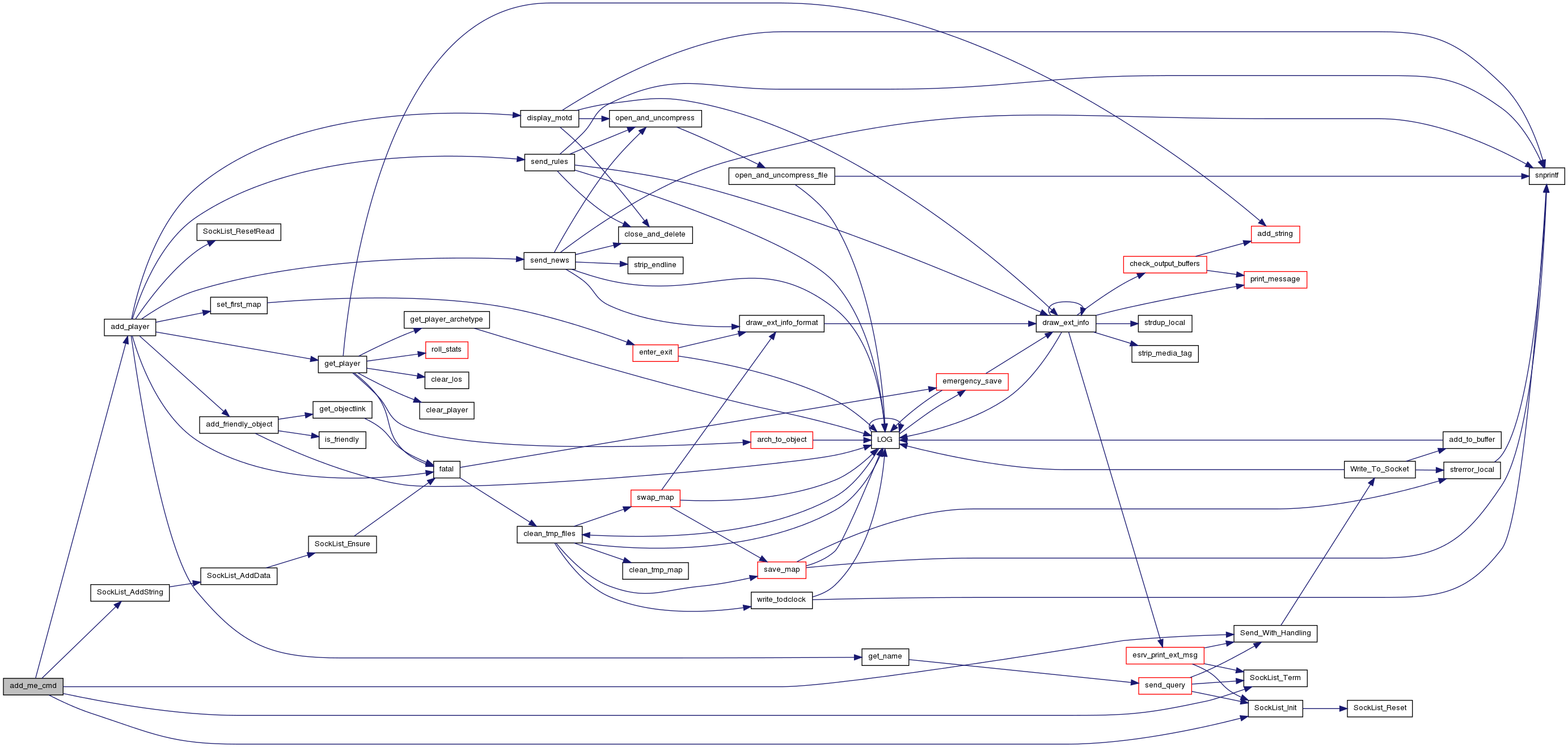
| static void append_spell | ( | player * | pl, |
| SockList * | sl, | ||
| object * | spell | ||
| ) | [static] |
appends the spell *spell to the Socklist we will send the data to.
Definition at line 1760 of file request.c.
References CS_STAT_SKILLINFO, esrv_send_face(), socket_struct::faces_sent, get_client_spell_state(), client_spell::last_dam, client_spell::last_grace, client_spell::last_sp, llevError, LOG(), NS_FACESENT_FACE, NUM_SKILLS, pl::ob, skill_names, pl::socket, SockList_AddChar(), SockList_AddData(), SockList_AddInt(), SockList_AddLen8Data(), SockList_AddShort(), SP_level_dam_adjust(), SP_level_spellpoint_cost(), SPELL_GRACE, and SPELL_MANA.
Referenced by esrv_add_spells().
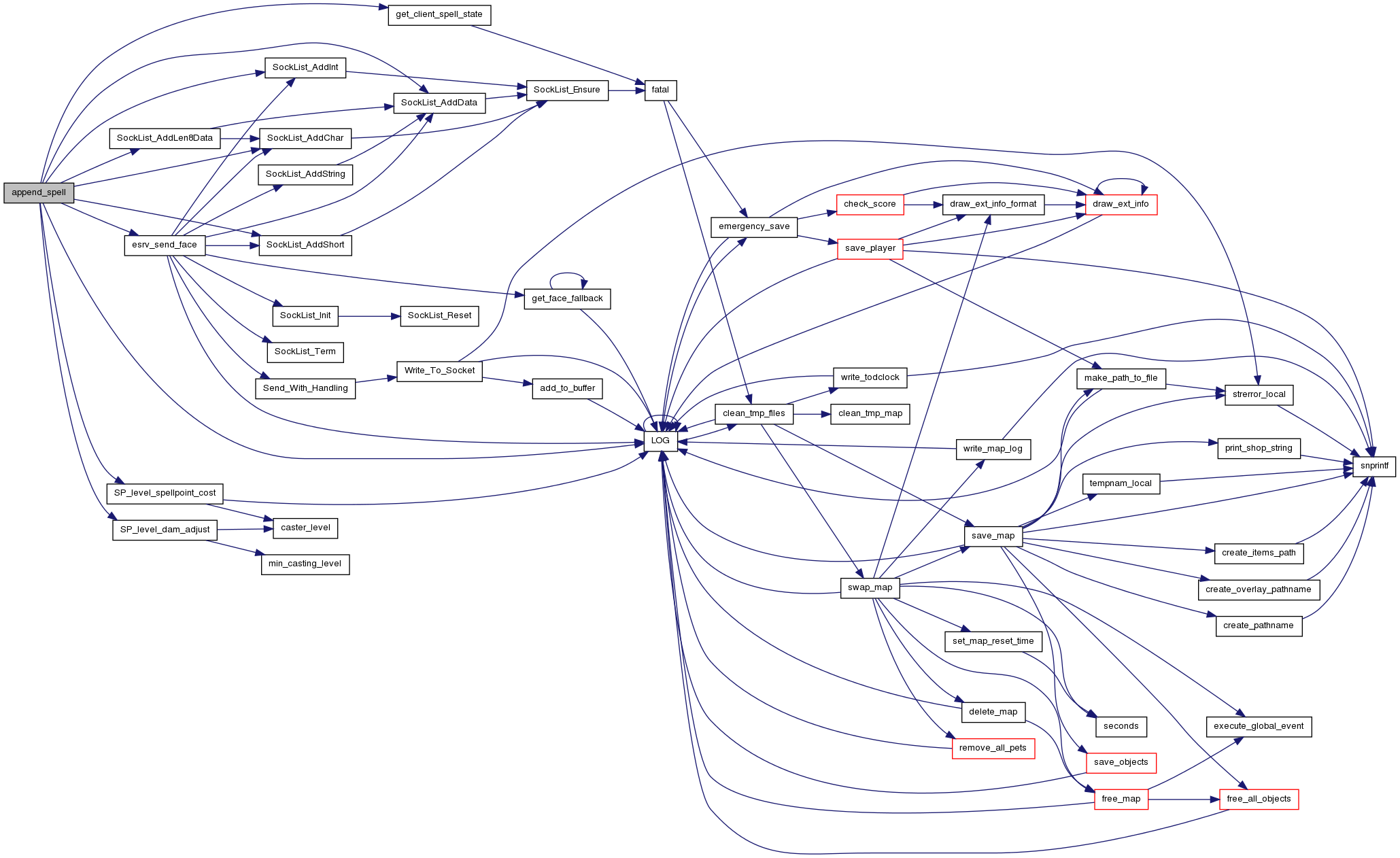

| void ask_smooth_cmd | ( | char * | buf, |
| int | len, | ||
| socket_struct * | ns | ||
| ) |
Tells client the picture it has to use to smooth a picture number given as argument.
Definition at line 473 of file request.c.
References send_smooth().
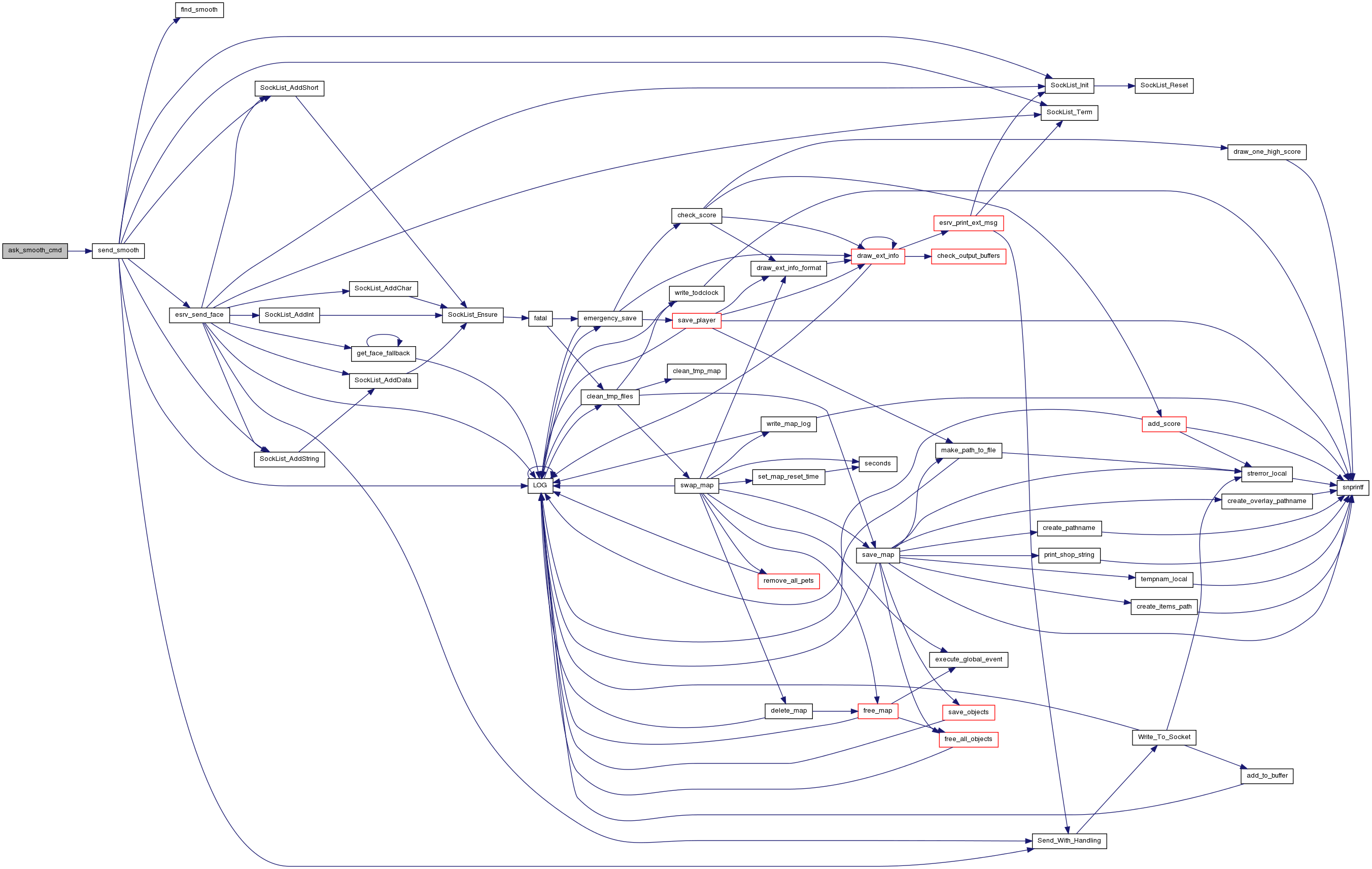
| static void build_class_list_reply | ( | SockList * | sl | ) | [static] |
Creates the appropriate reply to the 'class_list' request info.
- Parameters:
-
sl reply.
Definition at line 1620 of file request.c.
References CLASS, first_archetype, SockList_AddPrintf(), SockList_AddString(), and SockList_Reset().
Referenced by send_class_list().
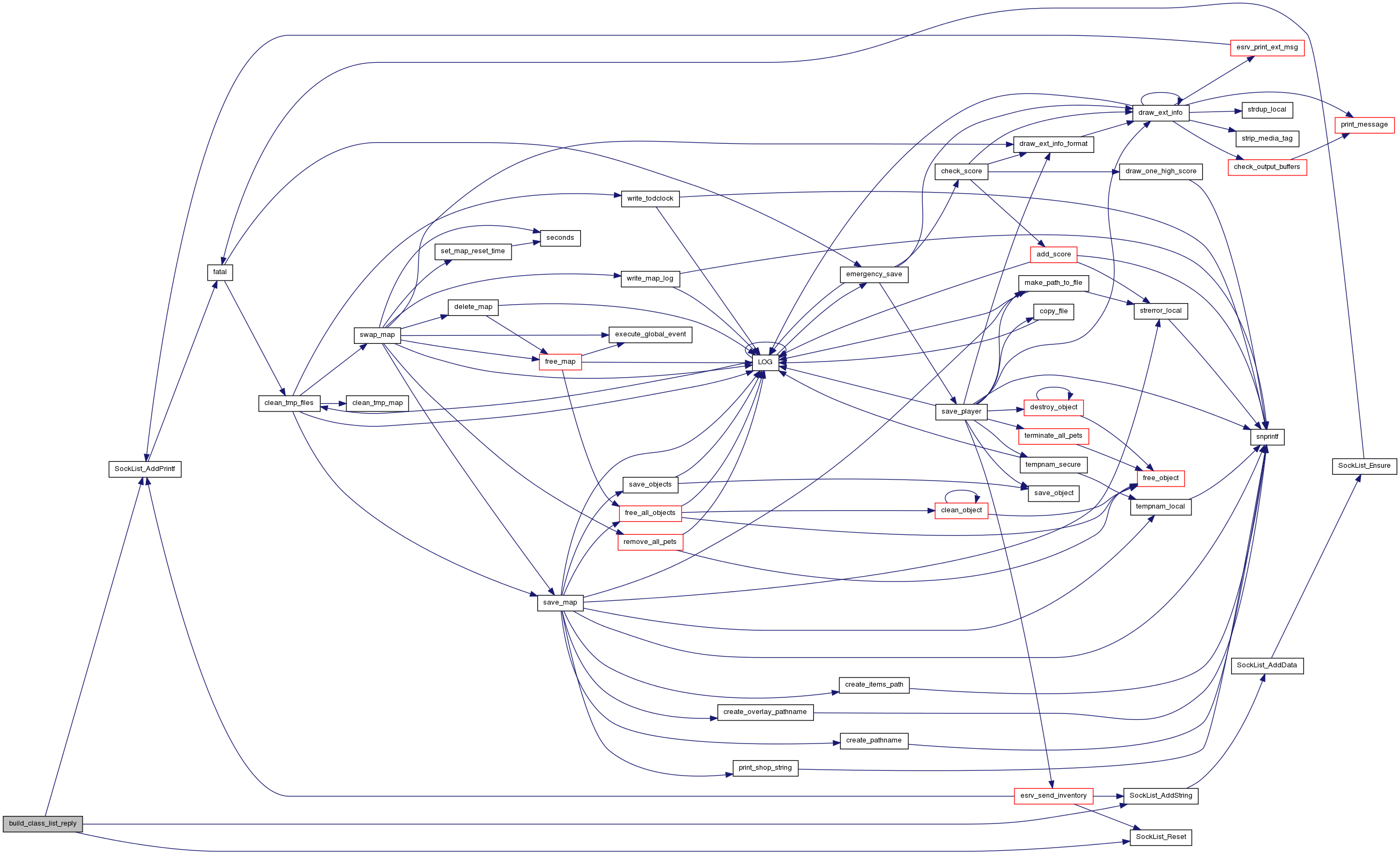

| static void build_race_list_reply | ( | SockList * | sl | ) | [static] |
Creates the appropriate reply to the 'race_list' request info.
- Parameters:
-
sl suitable reply.
Definition at line 1557 of file request.c.
References first_archetype, PLAYER, SockList_AddPrintf(), and SockList_AddString().
Referenced by send_race_list().
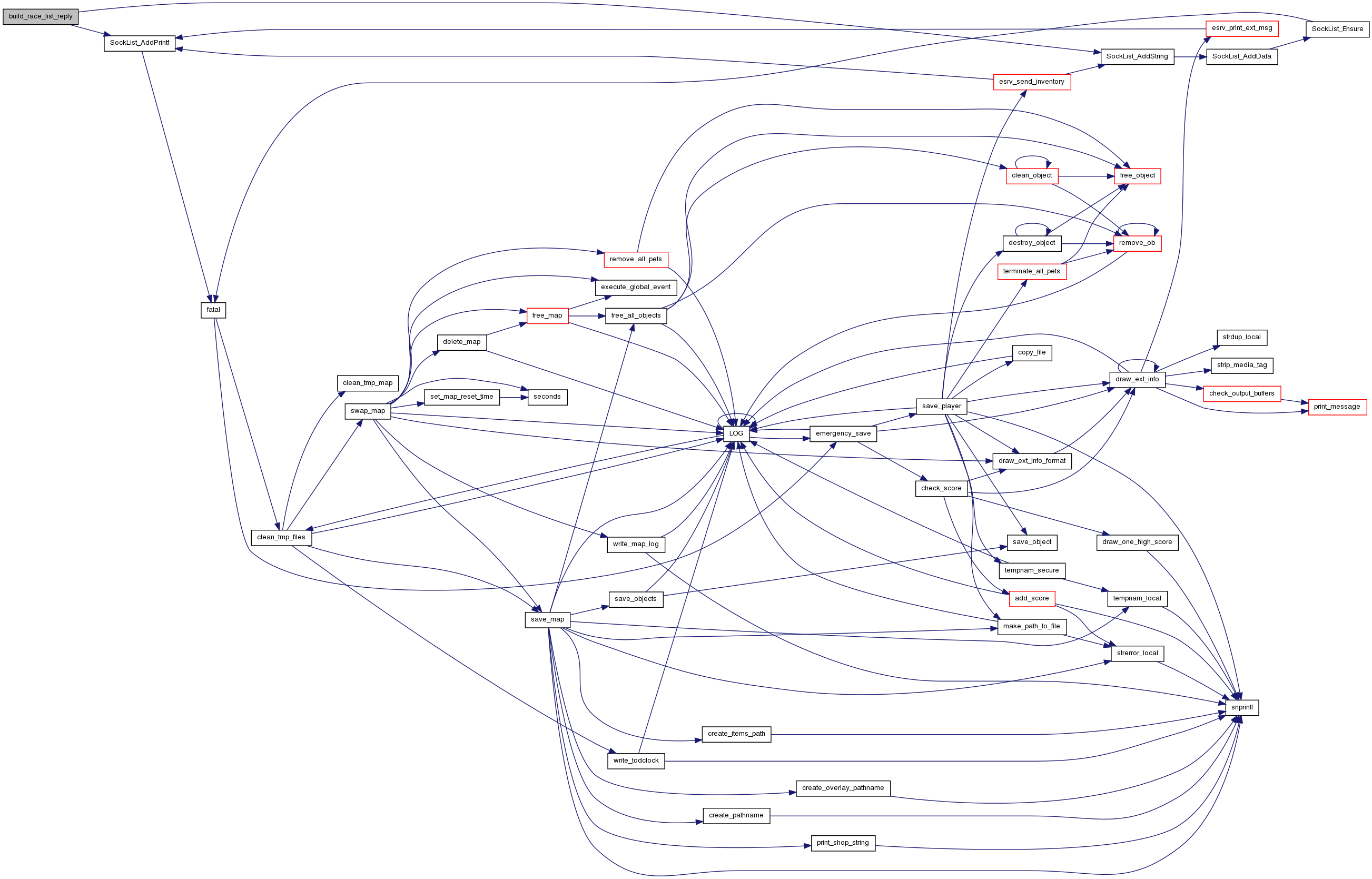

| static void check_space_for_heads | ( | int | ax, |
| int | ay, | ||
| SockList * | sl, | ||
| socket_struct * | ns | ||
| ) | [static] |
Definition at line 1148 of file request.c.
References Map::cells, heads, socket_struct::lastmap, SockList::len, map2_add_ob(), MAP2_COORD_ENCODE, map2_delete_layer(), map_clearcell(), MAP_LAYERS, SockList_AddChar(), and SockList_AddShort().
Referenced by draw_client_map2().
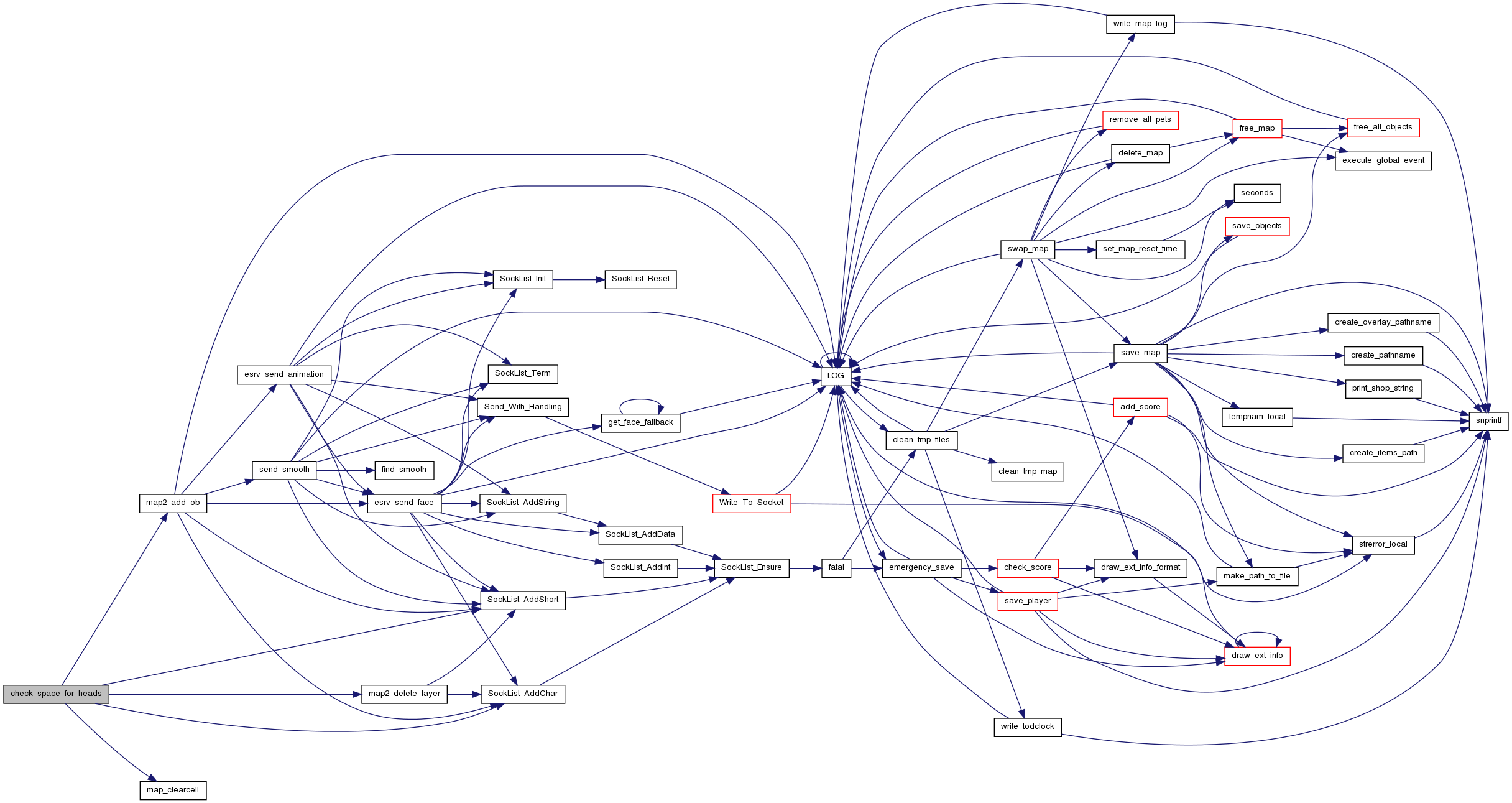

| void draw_client_map | ( | object * | pl | ) |
Draws client map.
Definition at line 1371 of file request.c.
References draw_client_map2(), get_map_flags(), mapdef::in_memory, llevError, LOG(), MAP_IN_MEMORY, P_NEED_UPDATE, P_NEW_MAP, P_OUT_OF_MAP, PLAYER, mapdef::timeout, update_los(), and update_position().
Referenced by do_server().
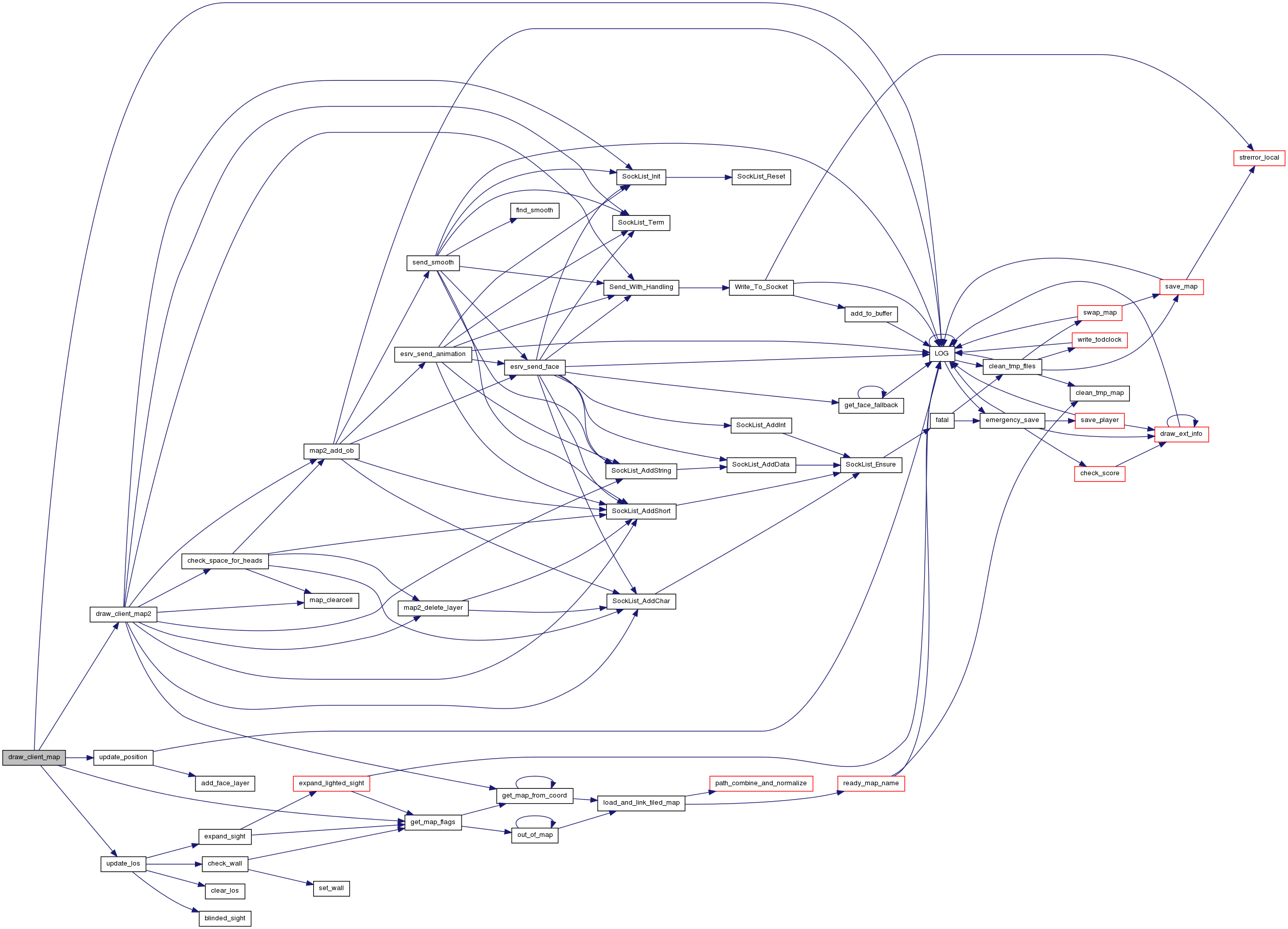

| void draw_client_map2 | ( | object * | pl | ) |
Definition at line 1194 of file request.c.
References check_space_for_heads(), GET_MAP_FACE_OBJ, get_map_from_coord(), heads, SockList::len, map2_add_ob(), MAP2_COORD_ENCODE, map2_delete_layer(), map_clearcell(), MAP_LAYER_LIVING1, MAP_LAYER_LIVING2, MAP_LAYERS, MAX_HEAD_OFFSET, MAX_LIGHT_RADII, Send_With_Handling(), SockList_AddChar(), SockList_AddShort(), SockList_AddString(), SockList_Init(), and SockList_Term().
Referenced by draw_client_map().
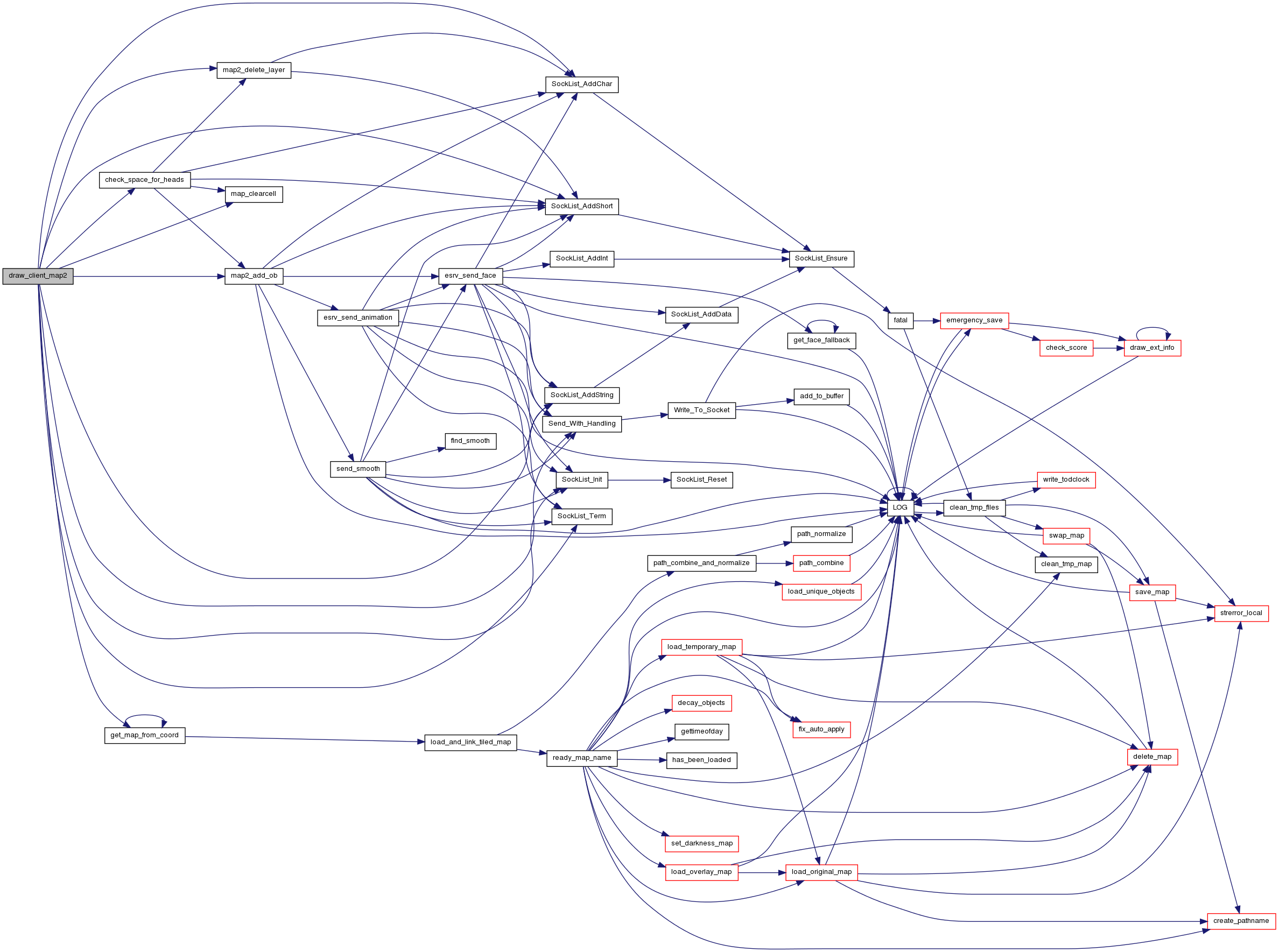

| void esrv_add_spells | ( | player * | pl, |
| object * | spell | ||
| ) |
This tells the client to add the spell *spell, if spell is NULL, then add all spells in the player's inventory.
Definition at line 1812 of file request.c.
References append_spell(), llevError, LOG(), socket_struct::monitor_spells, pl::ob, Send_With_Handling(), pl::socket, SockList_AddString(), SockList_Avail(), SockList_Init(), SockList_Reset(), SockList_Term(), and SPELL.
Referenced by check_login(), and do_learn_spell().
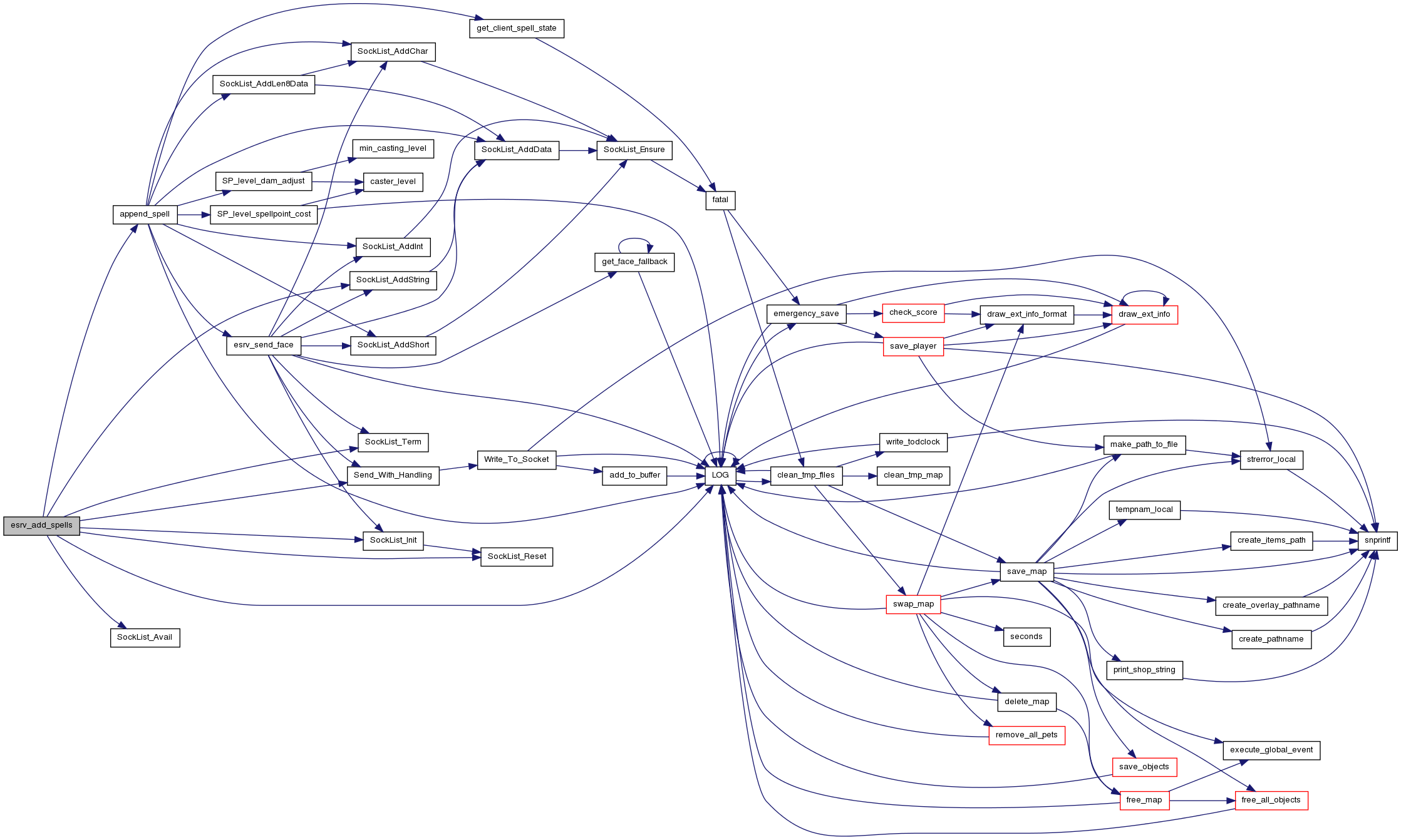

| void esrv_map_scroll | ( | socket_struct * | ns, |
| int | dx, | ||
| int | dy | ||
| ) |
Definition at line 1432 of file request.c.
References Map::cells, socket_struct::lastmap, socket_struct::map_scroll_x, socket_struct::map_scroll_y, socket_struct::mapx, socket_struct::mapy, and MAX_HEAD_OFFSET.
Referenced by attempt_jump(), move_ob(), push_ob(), shop_mat_type_move_on(), transport_type_apply(), and turn_one_transport().
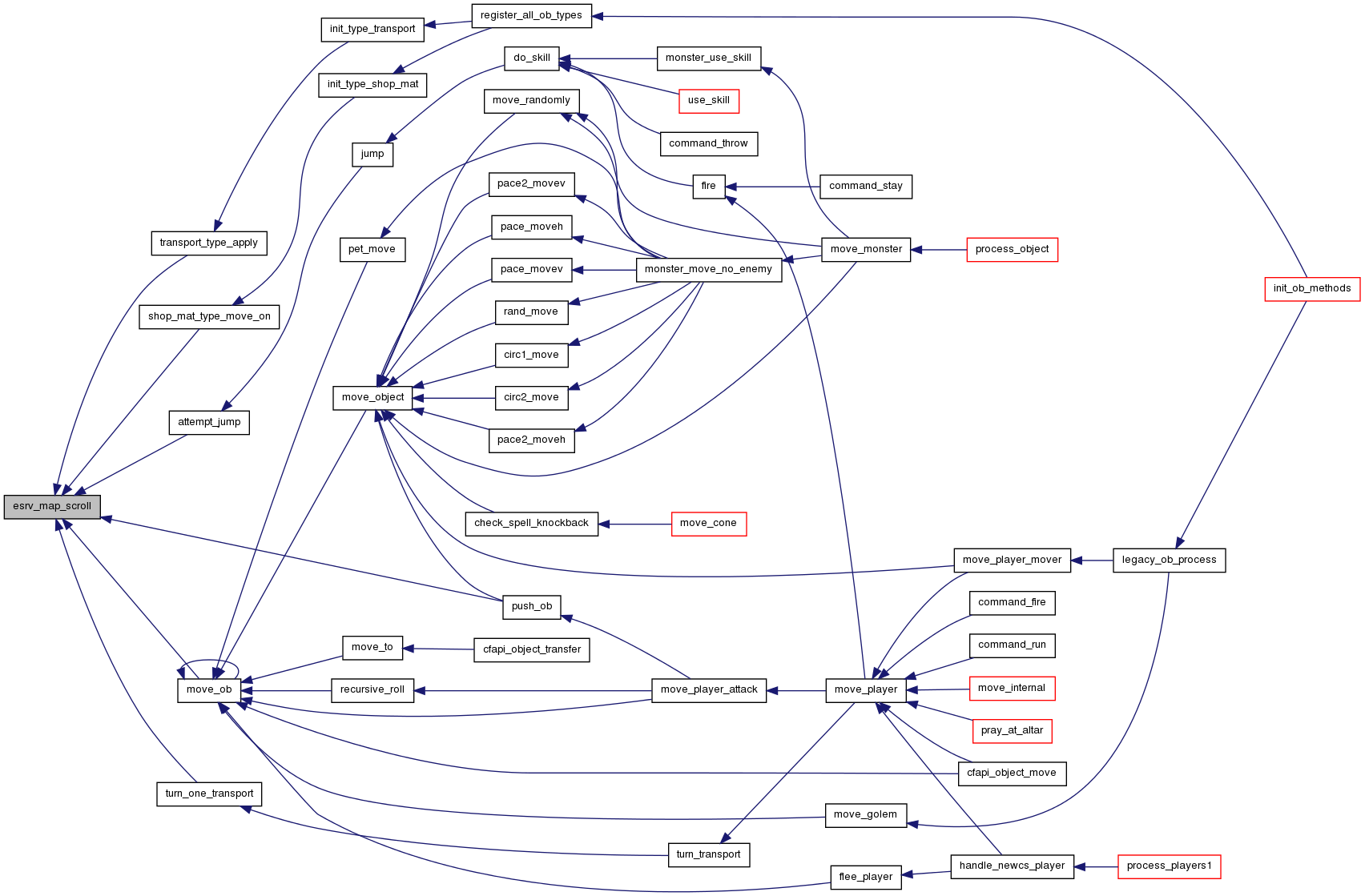
| void esrv_new_player | ( | player * | pl, |
| uint32 | weight | ||
| ) |
Tells the client that here is a player it should start using.
Definition at line 868 of file request.c.
References esrv_send_face(), socket_struct::faces_sent, FLAG_CLIENT_SENT, pl::last_weight, NS_FACESENT_FACE, pl::ob, Send_With_Handling(), SET_FLAG, pl::socket, SockList_AddInt(), SockList_AddLen8Data(), SockList_AddString(), SockList_Init(), and SockList_Term().
Referenced by check_login(), command_possess(), key_change_class(), and roll_again().
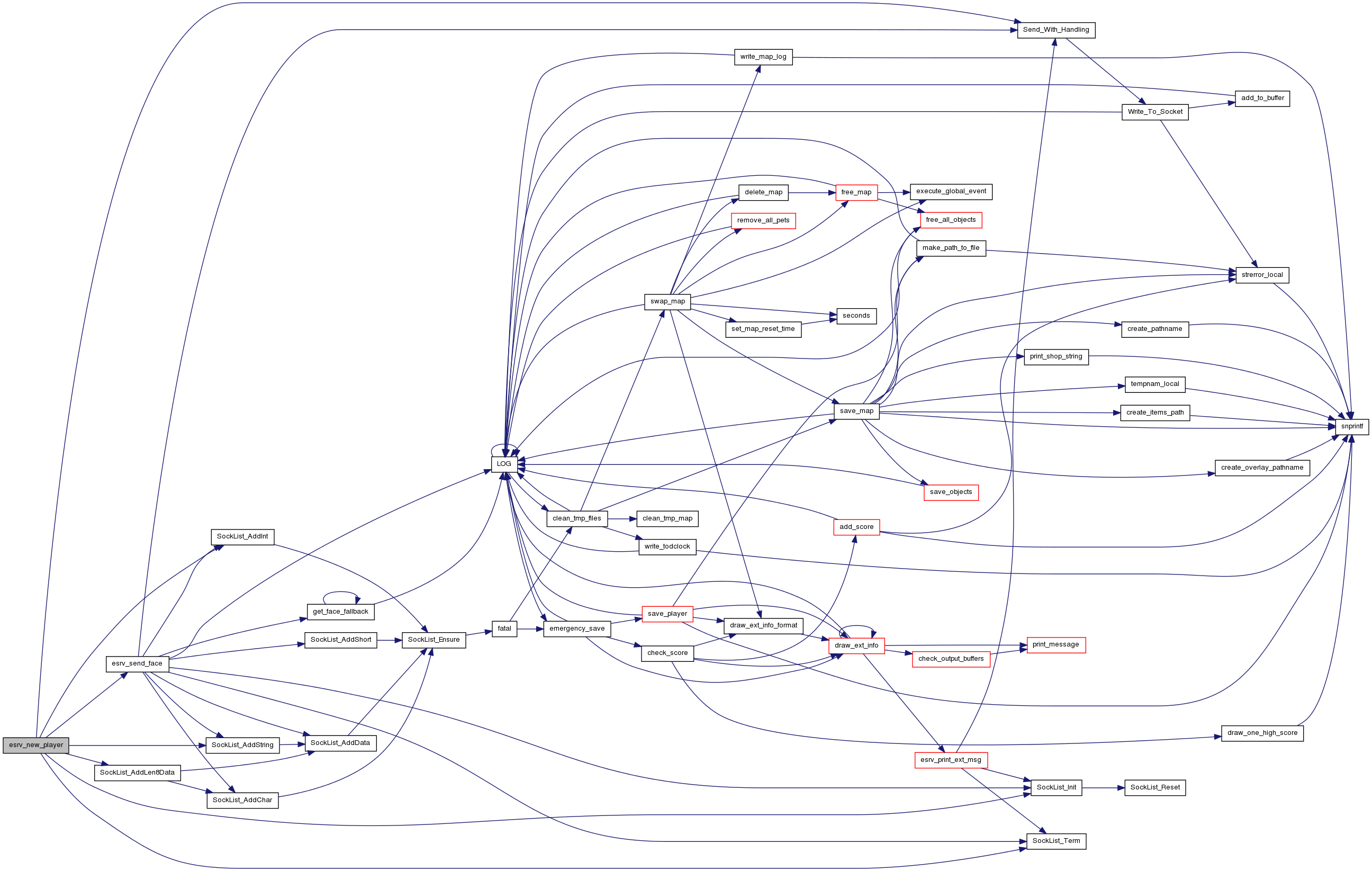

| void esrv_remove_spell | ( | player * | pl, |
| object * | spell | ||
| ) |
Definition at line 1725 of file request.c.
References llevError, LOG(), socket_struct::monitor_spells, pl::ob, Send_With_Handling(), pl::socket, SockList_AddInt(), SockList_AddString(), SockList_Init(), and SockList_Term().
Referenced by do_forget_spell().
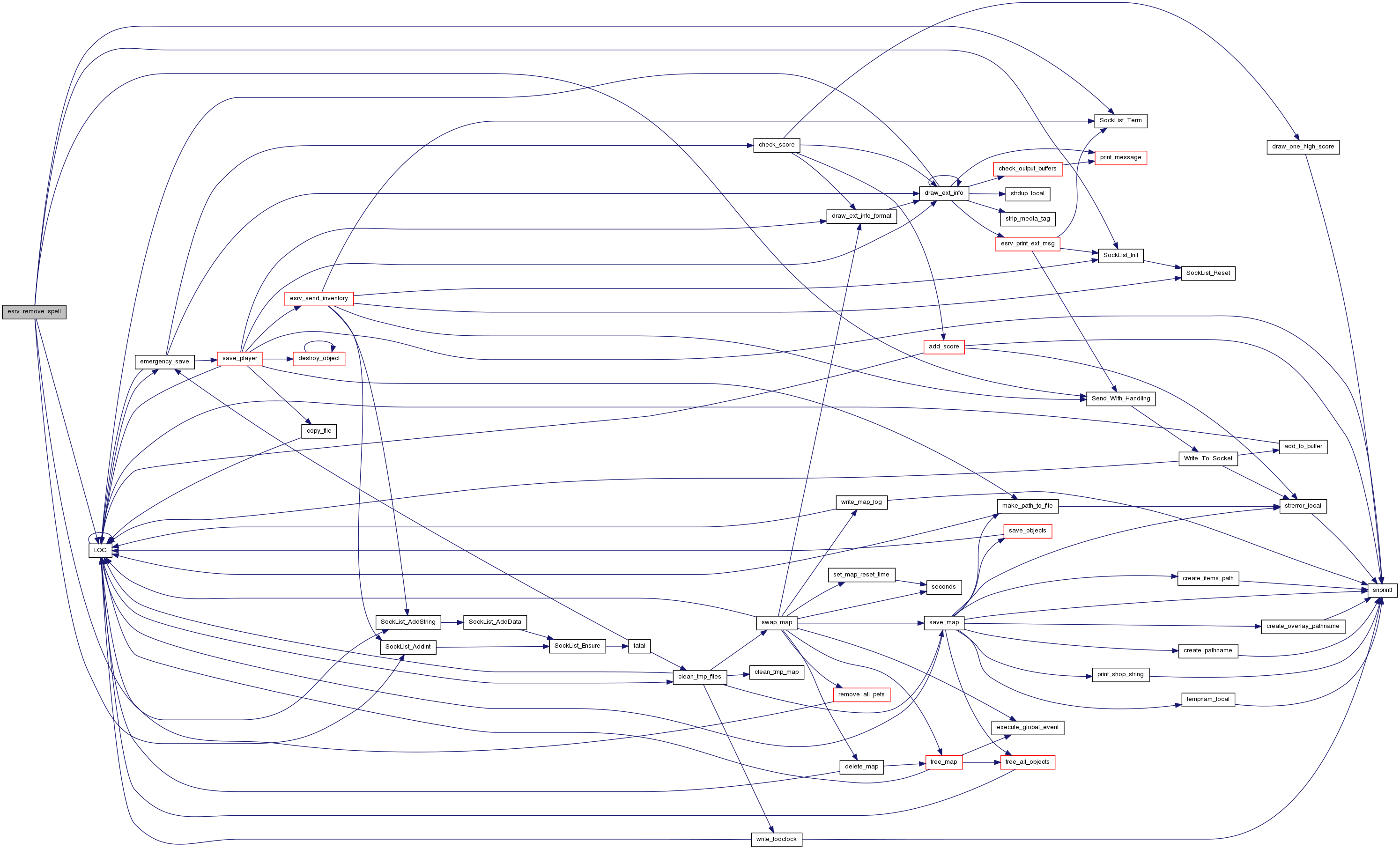

| void esrv_send_animation | ( | socket_struct * | ns, |
| short | anim_num | ||
| ) |
Need to send an animation sequence to the client.
We will send appropriate face commands to the client if we haven't sent them the face yet (this can become quite costly in terms of how much we are sending - on the other hand, this should only happen when the player logs in and picks stuff up.
Definition at line 895 of file request.c.
References animations, socket_struct::anims_sent, esrv_send_face(), animations_struct::faces, socket_struct::faces_sent, llevError, LOG(), NS_FACESENT_FACE, animations_struct::num_animations, num_animations, Send_With_Handling(), SockList_AddShort(), SockList_AddString(), SockList_Init(), and SockList_Term().
Referenced by add_object_to_socklist(), and map2_add_ob().
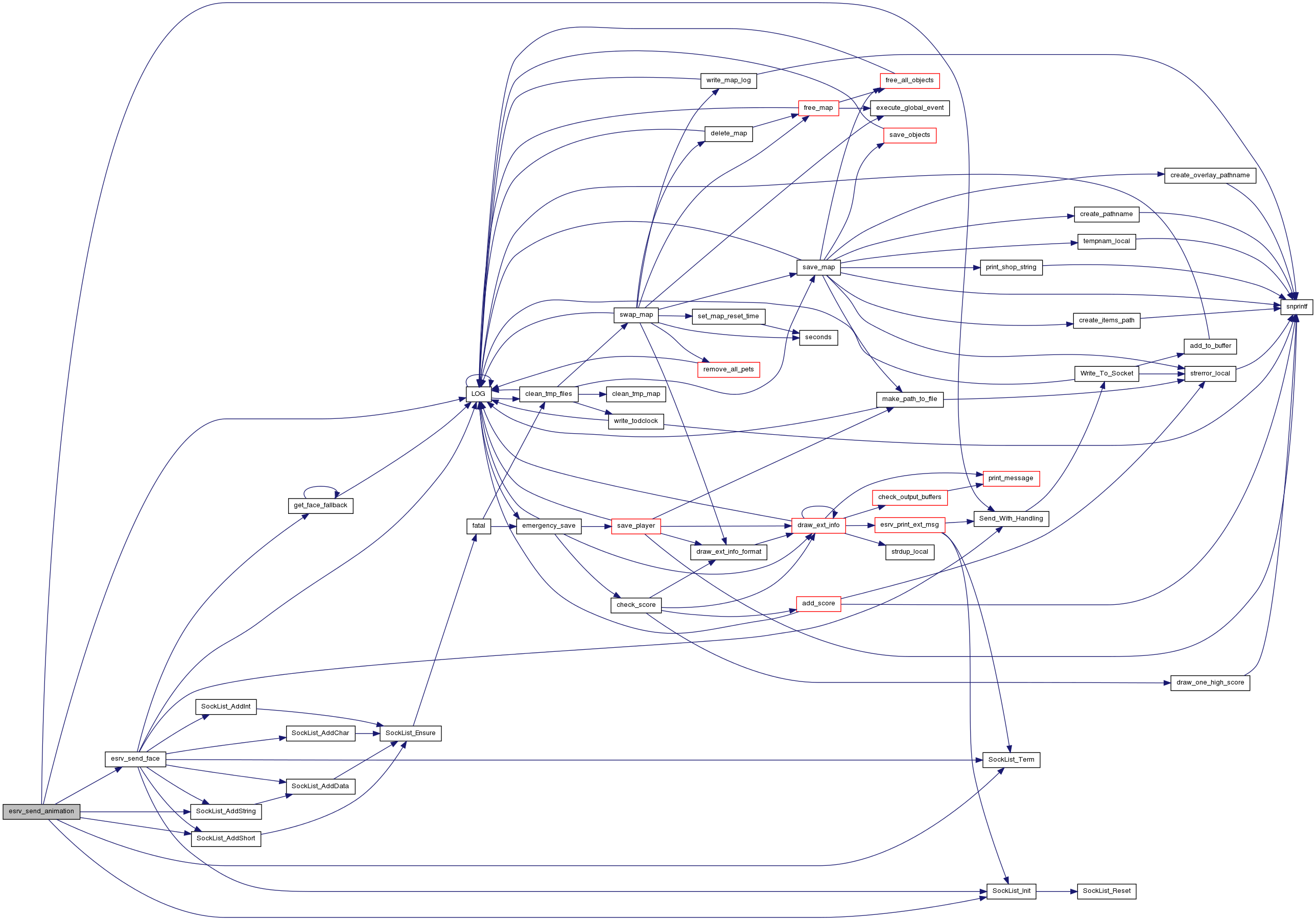
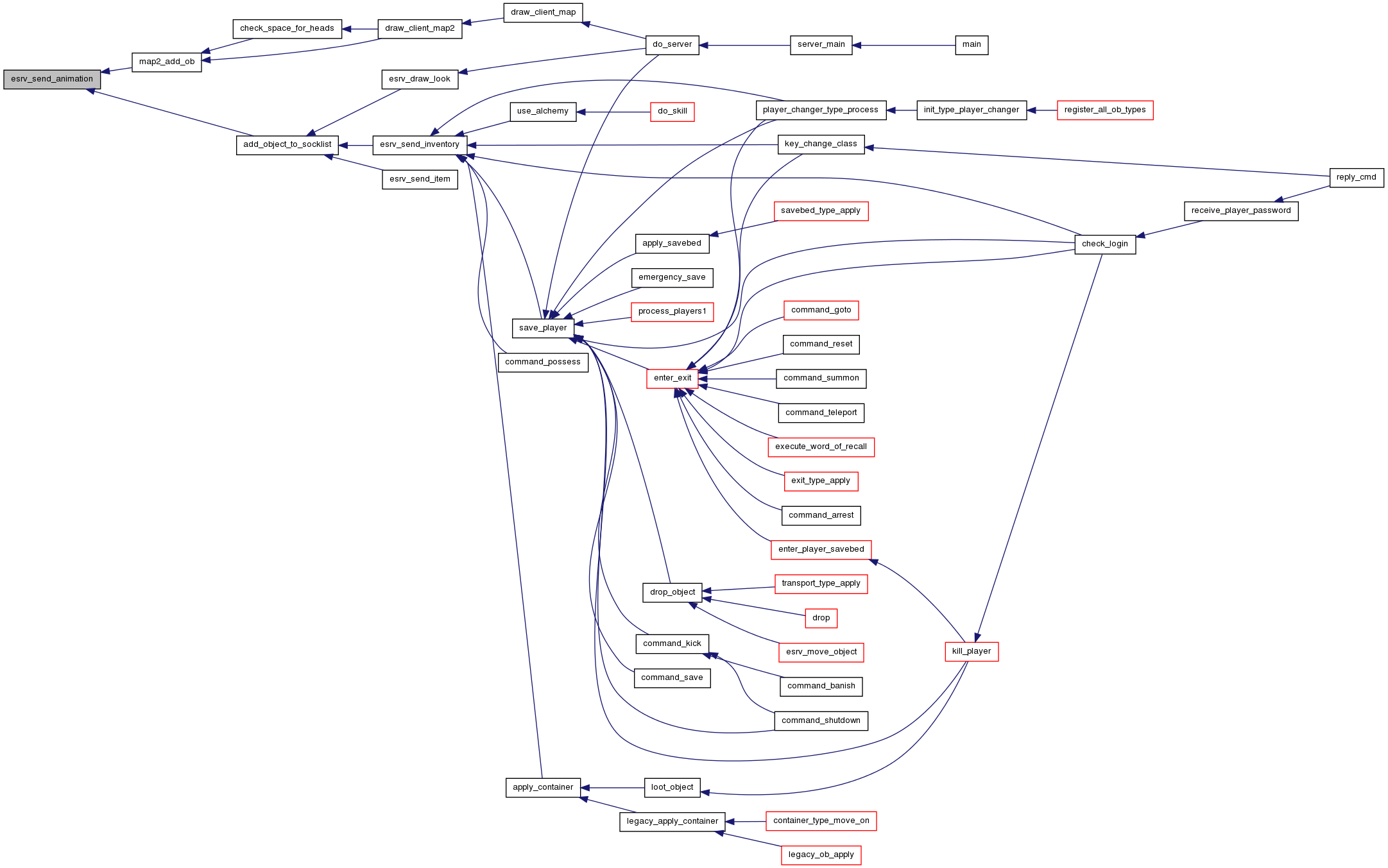
| void esrv_send_pickup | ( | player * | pl | ) |
Sends the "pickup" state to pl if client wants it requested.
- Parameters:
-
pl player that just logged in.
Definition at line 1747 of file request.c.
References pl::mode, Send_With_Handling(), pl::socket, SockList_AddInt(), SockList_AddString(), SockList_Init(), SockList_Term(), and socket_struct::want_pickup.
Referenced by check_login().
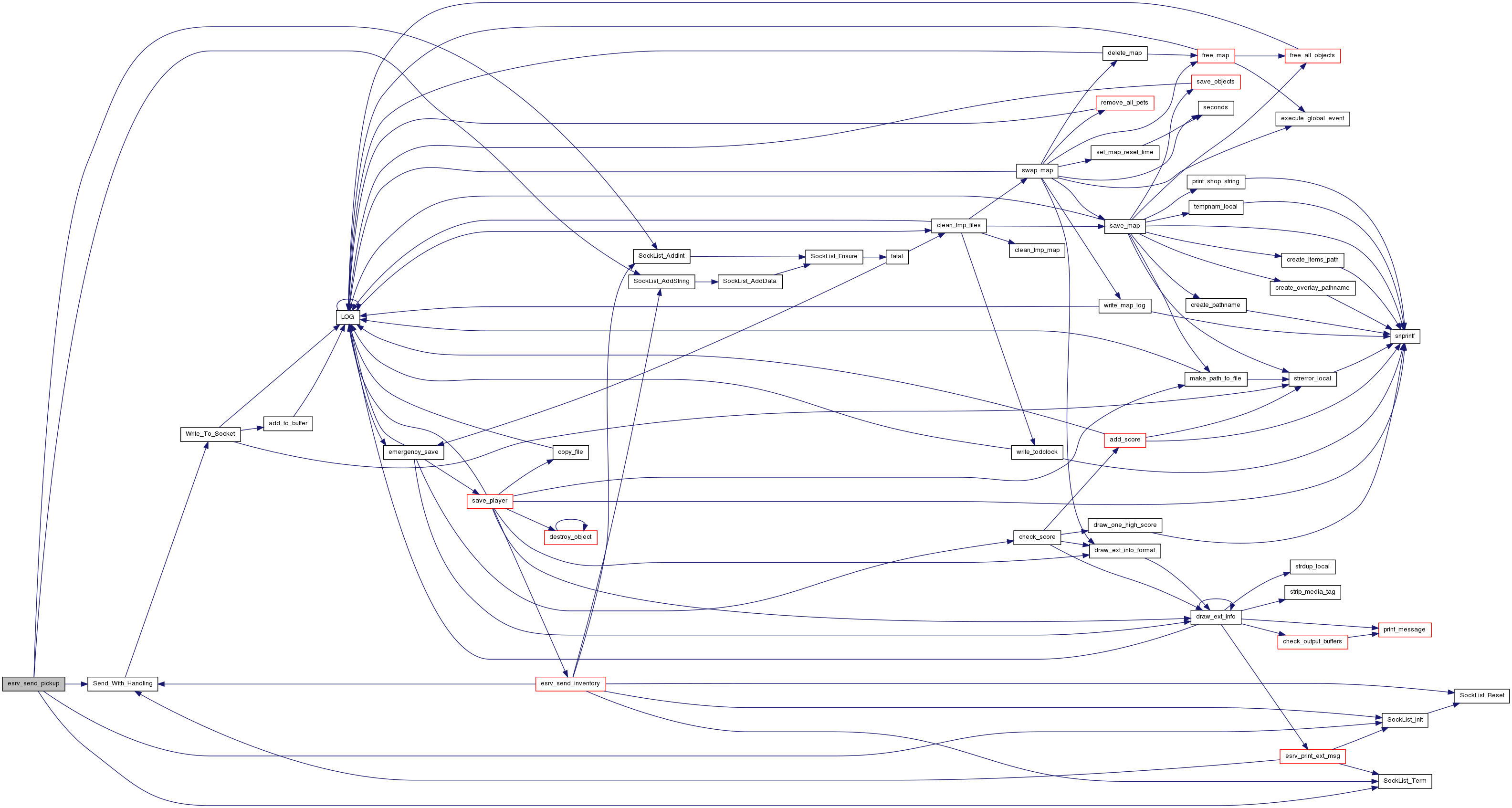

| void esrv_update_spells | ( | player * | pl | ) |
This looks for any spells the player may have that have changed their stats.
It then sends an updspell packet for each spell that has changed in this way.
Definition at line 1672 of file request.c.
References flags, get_client_spell_state(), client_spell::last_dam, client_spell::last_grace, client_spell::last_sp, socket_struct::monitor_spells, pl::ob, Send_With_Handling(), pl::socket, SockList_AddChar(), SockList_AddInt(), SockList_AddShort(), SockList_AddString(), SockList_Init(), SockList_Term(), SP_level_dam_adjust(), SP_level_spellpoint_cost(), SPELL, SPELL_GRACE, SPELL_MANA, pl::spell_state, UPD_SP_DAMAGE, UPD_SP_GRACE, and UPD_SP_MANA.
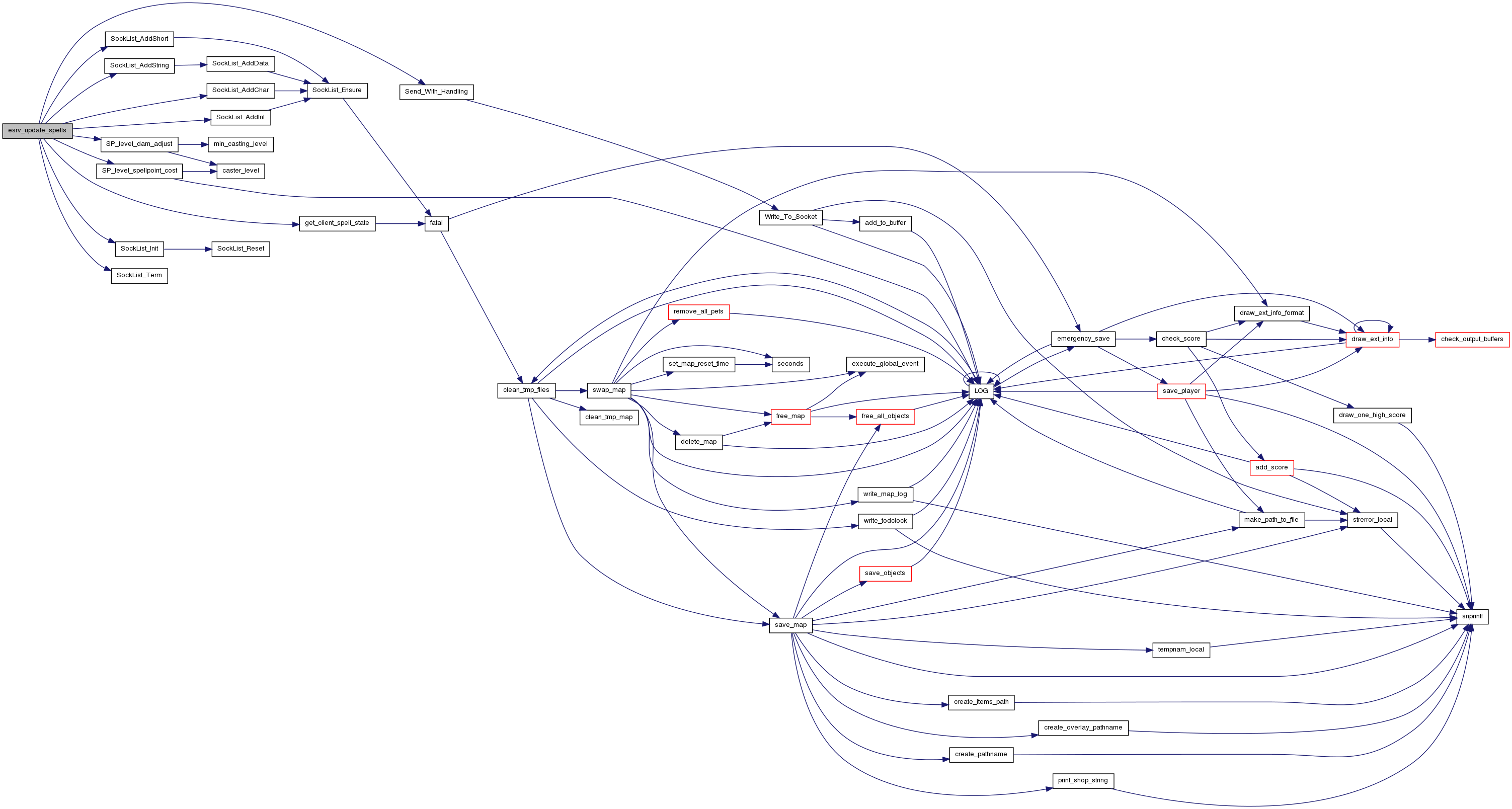
| void esrv_update_stats | ( | player * | pl | ) |
Sends a statistics update.
We look at the old values, and only send what has changed. Stat mapping values are in newclient.h Since this gets sent a lot, this is actually one of the few binary commands for now.
Definition at line 779 of file request.c.
References liv::ac, AddIfFloat, AddIfInt, AddIfInt64, AddIfShort, AddIfString, atnr_cs_stat, ATNR_PHYSICAL, liv::Cha, liv::Con, CS_STAT_AC, CS_STAT_ARMOUR, CS_STAT_CHA, CS_STAT_CON, CS_STAT_DAM, CS_STAT_DEX, CS_STAT_EXP64, CS_STAT_FLAGS, CS_STAT_FOOD, CS_STAT_GRACE, CS_STAT_HP, CS_STAT_INT, CS_STAT_LEVEL, CS_STAT_MAXGRACE, CS_STAT_MAXHP, CS_STAT_MAXSP, CS_STAT_POW, CS_STAT_RANGE, CS_STAT_SKILLINFO, CS_STAT_SP, CS_STAT_SPEED, CS_STAT_SPELL_ATTUNE, CS_STAT_SPELL_DENY, CS_STAT_SPELL_REPEL, CS_STAT_STR, CS_STAT_TITLE, CS_STAT_WC, CS_STAT_WEAP_SP, CS_STAT_WEIGHT_LIM, CS_STAT_WIS, liv::dam, liv::Dex, liv::exp, pl::fire_on, flags, liv::food, liv::grace, liv::hp, liv::Int, pl::last_flags, pl::last_level, pl::last_path_attuned, pl::last_path_denied, pl::last_path_repelled, pl::last_resist, pl::last_skill_exp, pl::last_skill_ob, pl::last_speed, pl::last_stats, pl::last_weapon_sp, pl::last_weight_limit, SockList::len, llevDebug, LOG(), MAX_BUF, liv::maxgrace, liv::maxhp, liv::maxsp, socket_struct::monitor_spells, NROFATTACKS, NUM_SKILLS, pl::ob, liv::Pow, statsinfo::range, rangetostring(), pl::run_on, socket_struct::sc_version, Send_With_Handling(), set_title(), SF_FIREON, SF_RUNON, pl::socket, SockList_AddChar(), SockList_AddInt64(), SockList_AddString(), SockList_Init(), SockList_Term(), liv::sp, socket_struct::stats, liv::Str, statsinfo::title, liv::wc, pl::weapon_sp, weight_limit, and liv::Wis.
Referenced by do_server().
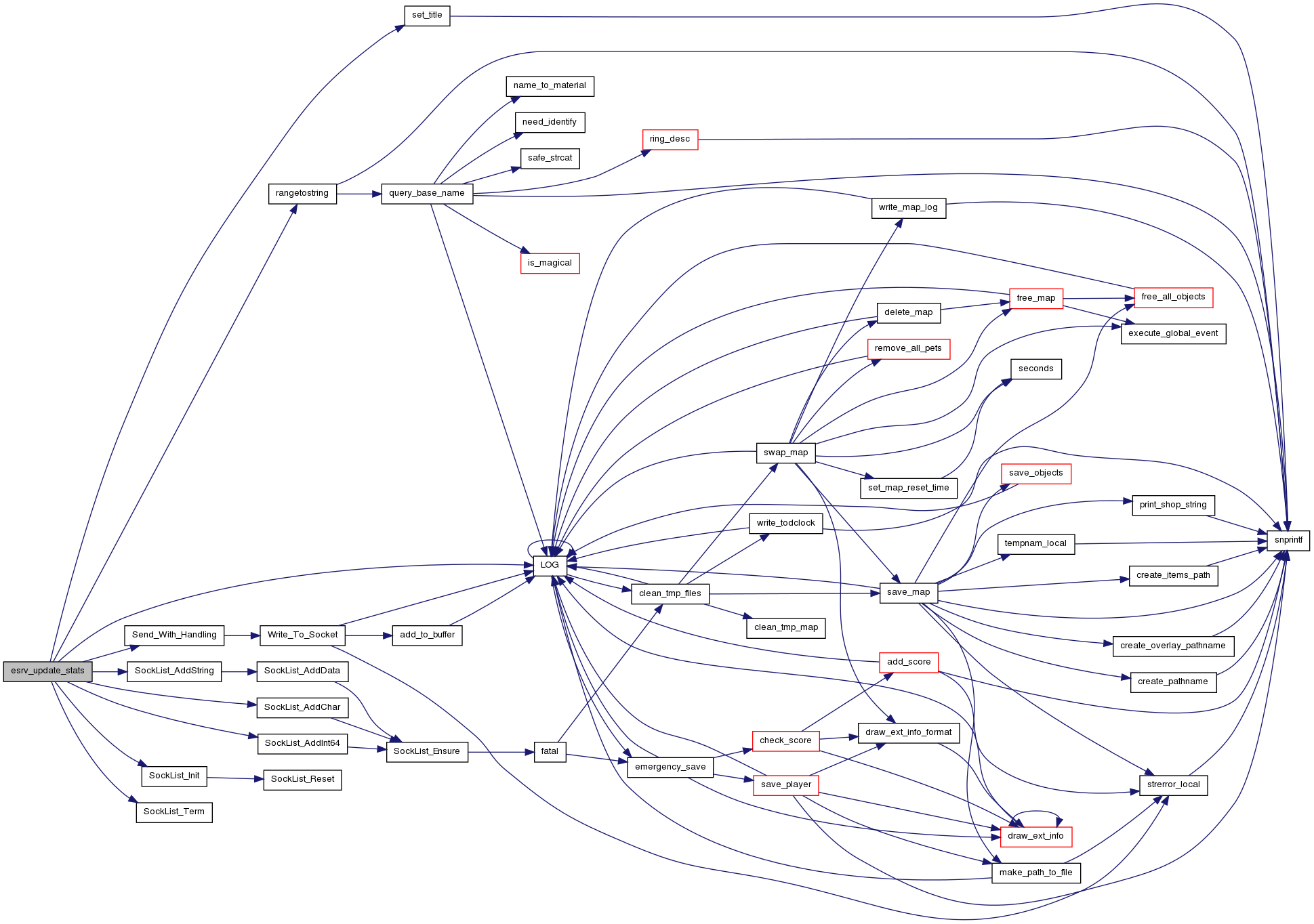

| static int map2_add_ob | ( | int | ax, |
| int | ay, | ||
| int | layer, | ||
| object * | ob, | ||
| SockList * | sl, | ||
| socket_struct * | ns, | ||
| int * | has_obj, | ||
| int | is_head | ||
| ) | [static] |
object 'ob' at 'ax,ay' on 'layer' is visible to the client.
This function does the following things: If is_head head is set, this means this is from the heads[] array, so don't try to store it away again - just send it and update our look faces.
1) If a multipart object and we are not at the lower right corner, store this info away for later use. 2) Check to see if this face has been sent to the client. If not, we add data to the socklist, update the last map, and send any other data the client will need (smoothing table, image data, etc) 3) Return 1 if function increased socket. 4) has_obj is increased by one if there are visible objects on this this space, whether or not we sent them. Basically, if has_obj is 0, we can clear info about this space. It could be set to 1 with the function returning zero - this means there are objects on the space we have already sent to the client.
Definition at line 974 of file request.c.
References ANIM_RANDOM, ANIM_SYNC, animations, socket_struct::anims_sent, Map::cells, esrv_send_animation(), esrv_send_face(), FABS, animations_struct::faces, map_cell_struct::faces, socket_struct::faces_sent, FLAG_CLIENT_ANIM_RANDOM, FLAG_CLIENT_ANIM_SYNC, heads, socket_struct::lastmap, llevError, LOG(), MAP_LAYERS, MAP_NOSMOOTH, NS_FACESENT_FACE, NS_FACESENT_SMOOTH, NUM_ANIMATIONS, QUERY_FLAG, send_smooth(), SockList_AddChar(), and SockList_AddShort().
Referenced by check_space_for_heads(), and draw_client_map2().
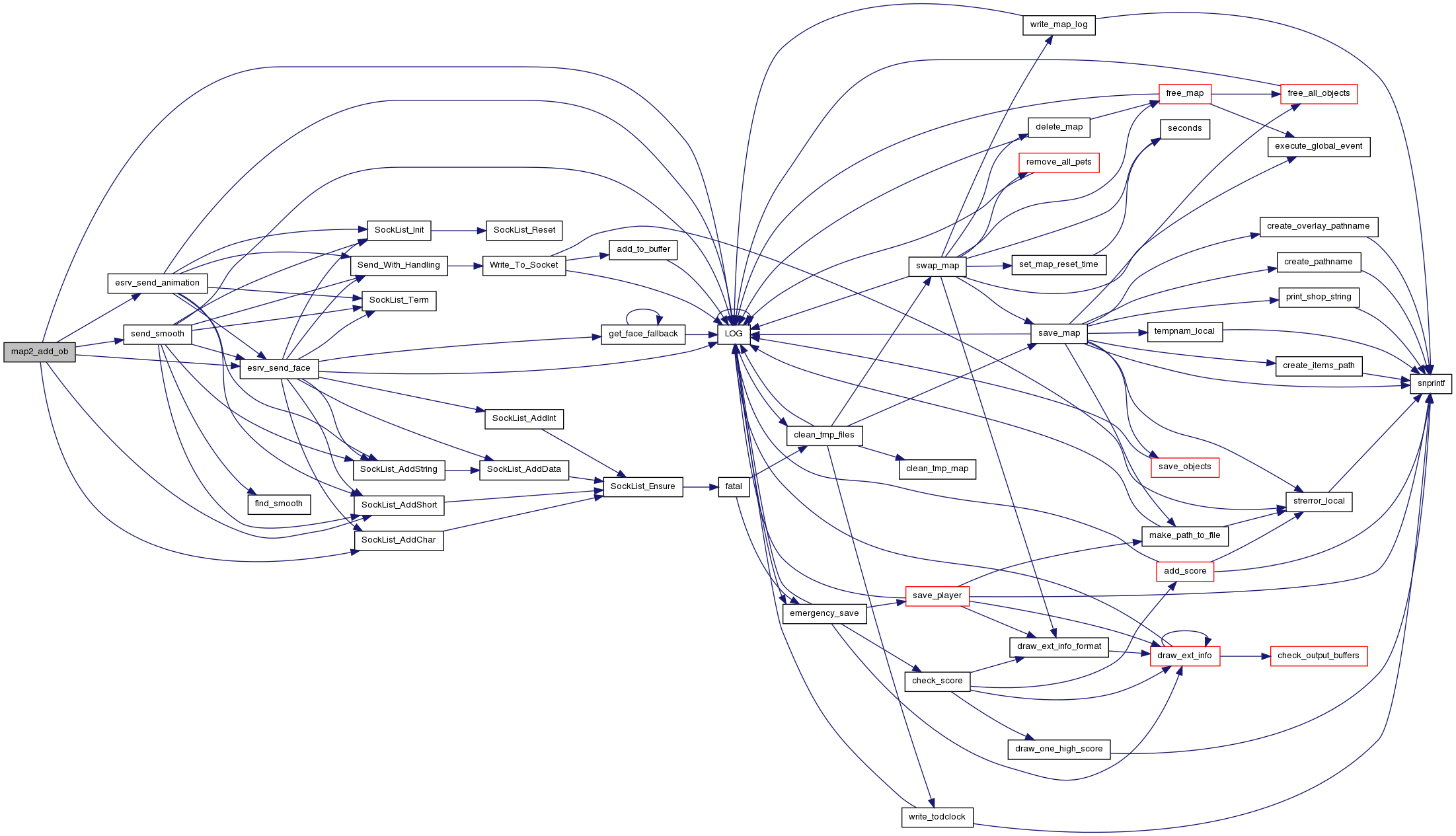

| static int map2_delete_layer | ( | int | ax, |
| int | ay, | ||
| int | layer, | ||
| SockList * | sl, | ||
| socket_struct * | ns | ||
| ) | [static] |
Definition at line 1119 of file request.c.
References Map::cells, map_cell_struct::faces, socket_struct::lastmap, SockList_AddChar(), and SockList_AddShort().
Referenced by check_space_for_heads(), and draw_client_map2().
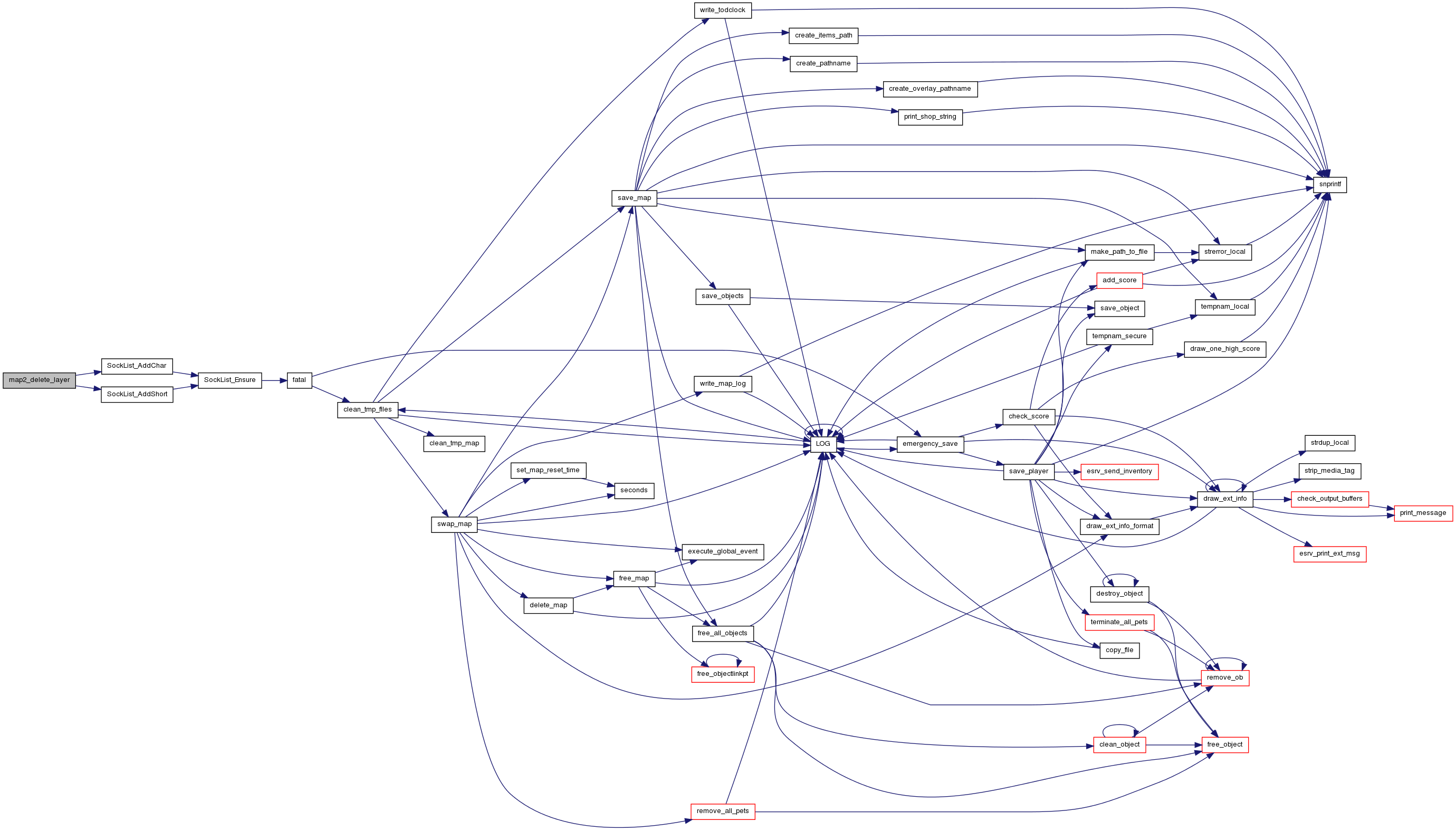

| static void map_clearcell | ( | struct map_cell_struct * | cell, |
| int | face, | ||
| int | count | ||
| ) | [static] |
Clears a map cell.
Definition at line 933 of file request.c.
References map_cell_struct::darkness, and map_cell_struct::faces.
Referenced by check_space_for_heads(), and draw_client_map2().

| void map_newmap_cmd | ( | socket_struct * | ns | ) |
Newmap command.
Definition at line 672 of file request.c.
References socket_struct::lastmap, socket_struct::map_scroll_x, socket_struct::map_scroll_y, socket_struct::newmapcmd, Send_With_Handling(), SockList_AddString(), SockList_Init(), and SockList_Term().
Referenced by cfapi_object_teleport(), dimension_door(), enter_map(), process_players1(), set_up_cmd(), teleport(), and transfer_ob().
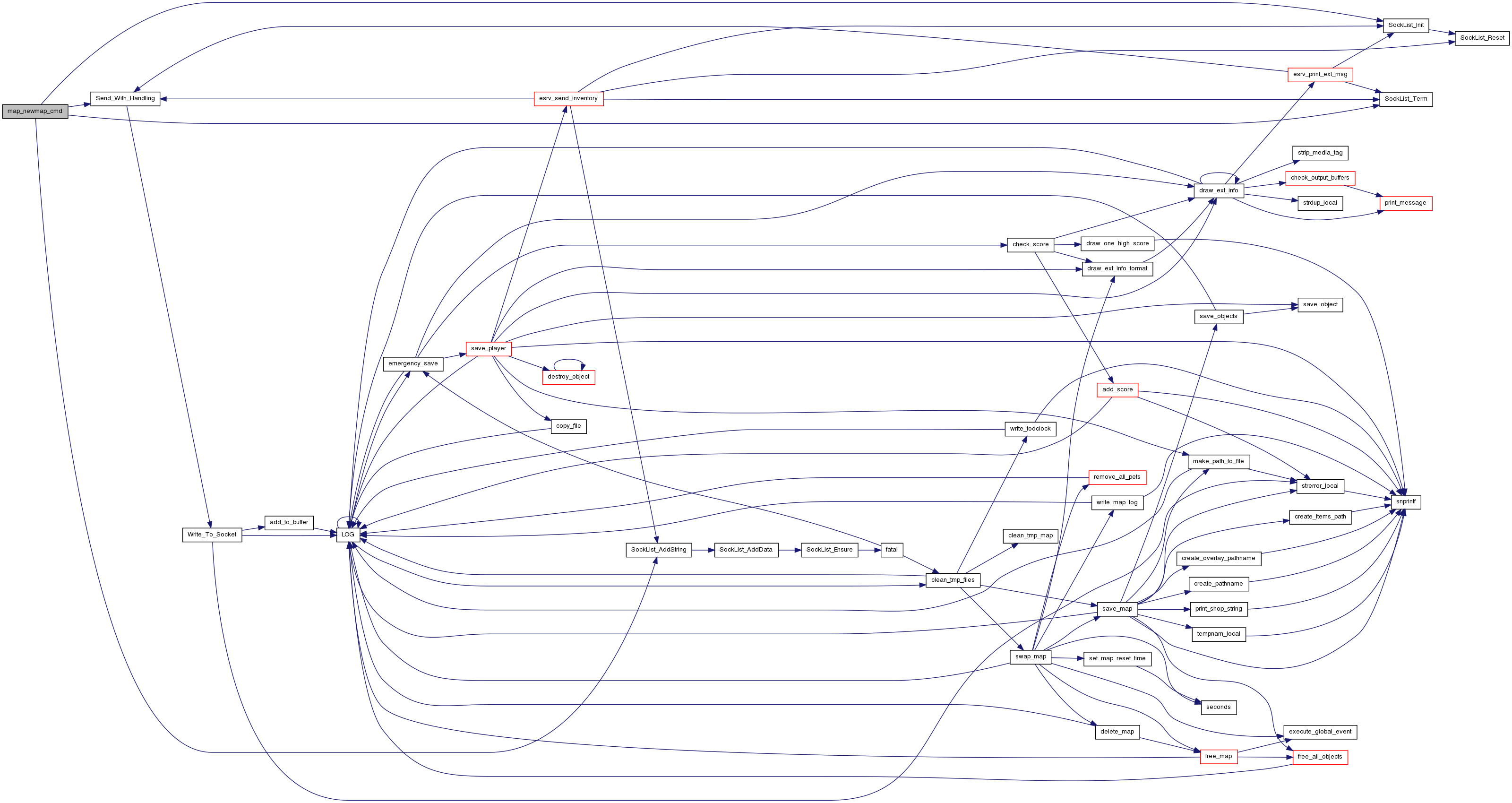
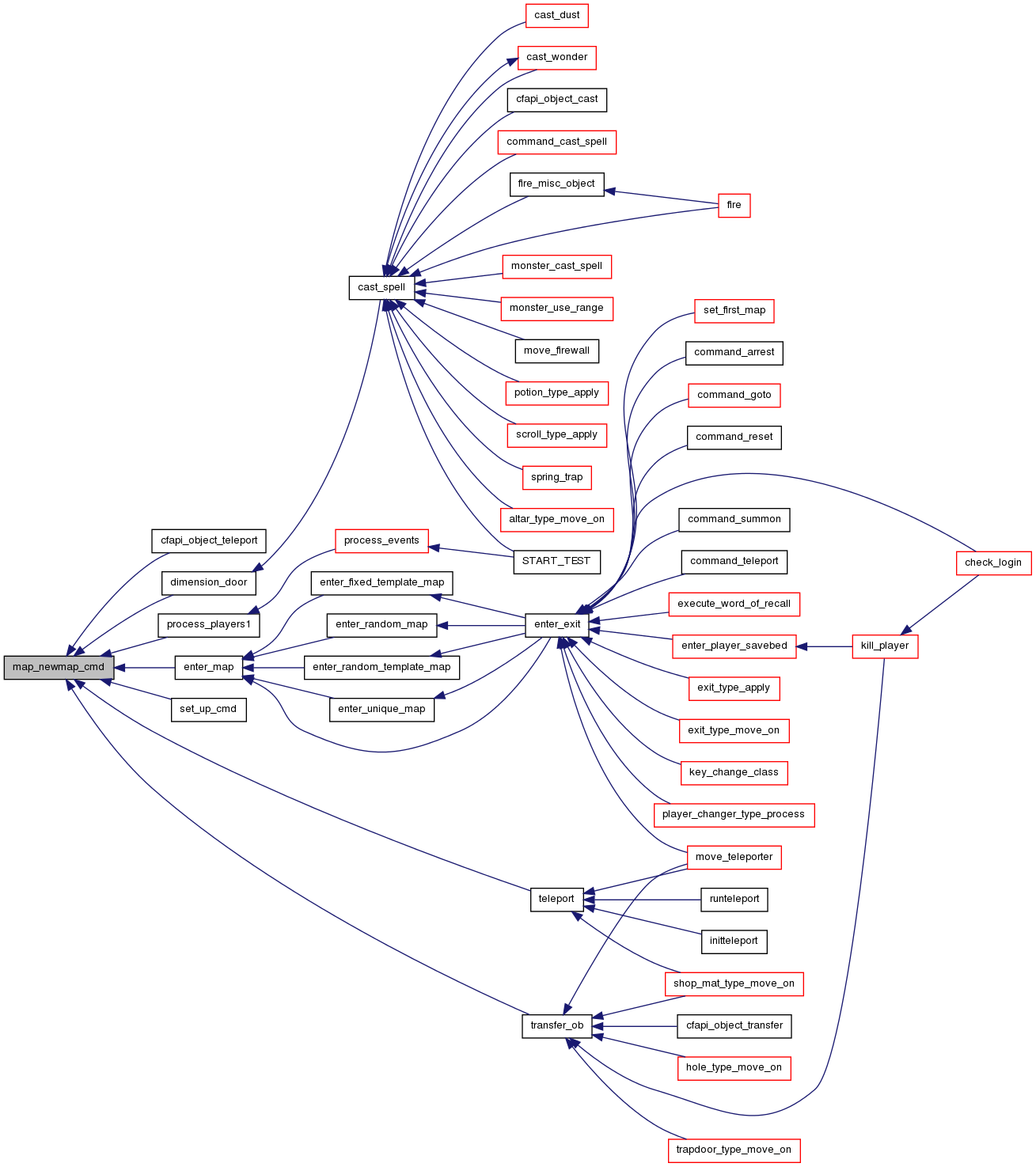
| void map_redraw_cmd | ( | char * | buf, |
| int | len, | ||
| player * | pl | ||
| ) |
| void new_player_cmd | ( | uint8 * | buf, |
| int | len, | ||
| player * | pl | ||
| ) |
This handles the commands issued by the player (ie, north, fire, cast, etc.).
This is called with the 'ncom' method which gives more information back to the client so it can throttle.
- Parameters:
-
buf data received. len length of buf. pl player who issued the command. Mustn't be NULL.
Definition at line 492 of file request.c.
References pl::count, draw_ext_info_format(), execute_newserver_command(), FABS, GetInt_String(), GetShort_String(), llevDebug, llevError, LOG(), MAX_BUF, MAX_TIME, MSG_TYPE_COMMAND, MSG_TYPE_COMMAND_ERROR, NDI_UNIQUE, pl::ob, Send_With_Handling(), pl::socket, SockList_AddInt(), SockList_AddShort(), SockList_AddString(), SockList_Init(), SockList_Term(), ST_PLAYING, and pl::state.
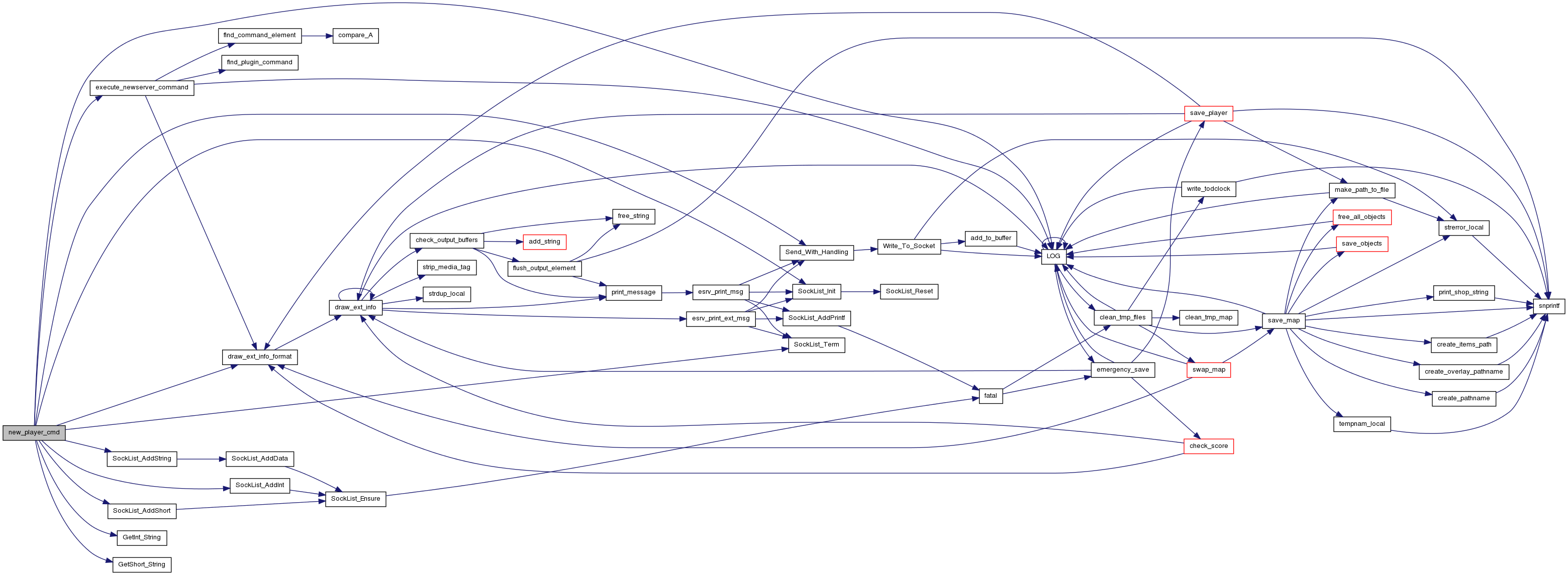
This is a reply to a previous query.
Definition at line 555 of file request.c.
References key_change_class(), key_confirm_quit(), key_roll_stat(), llevError, LOG(), pl::ob, receive_party_password(), receive_play_again(), receive_player_name(), receive_player_password(), snprintf(), ST_CHANGE_CLASS, ST_CHANGE_PASSWORD_CONFIRM, ST_CHANGE_PASSWORD_NEW, ST_CHANGE_PASSWORD_OLD, ST_CONFIRM_PASSWORD, ST_CONFIRM_QUIT, ST_GET_NAME, ST_GET_PARTY_PASSWORD, ST_GET_PASSWORD, ST_PLAY_AGAIN, ST_PLAYING, ST_ROLL_STAT, pl::state, and pl::write_buf.
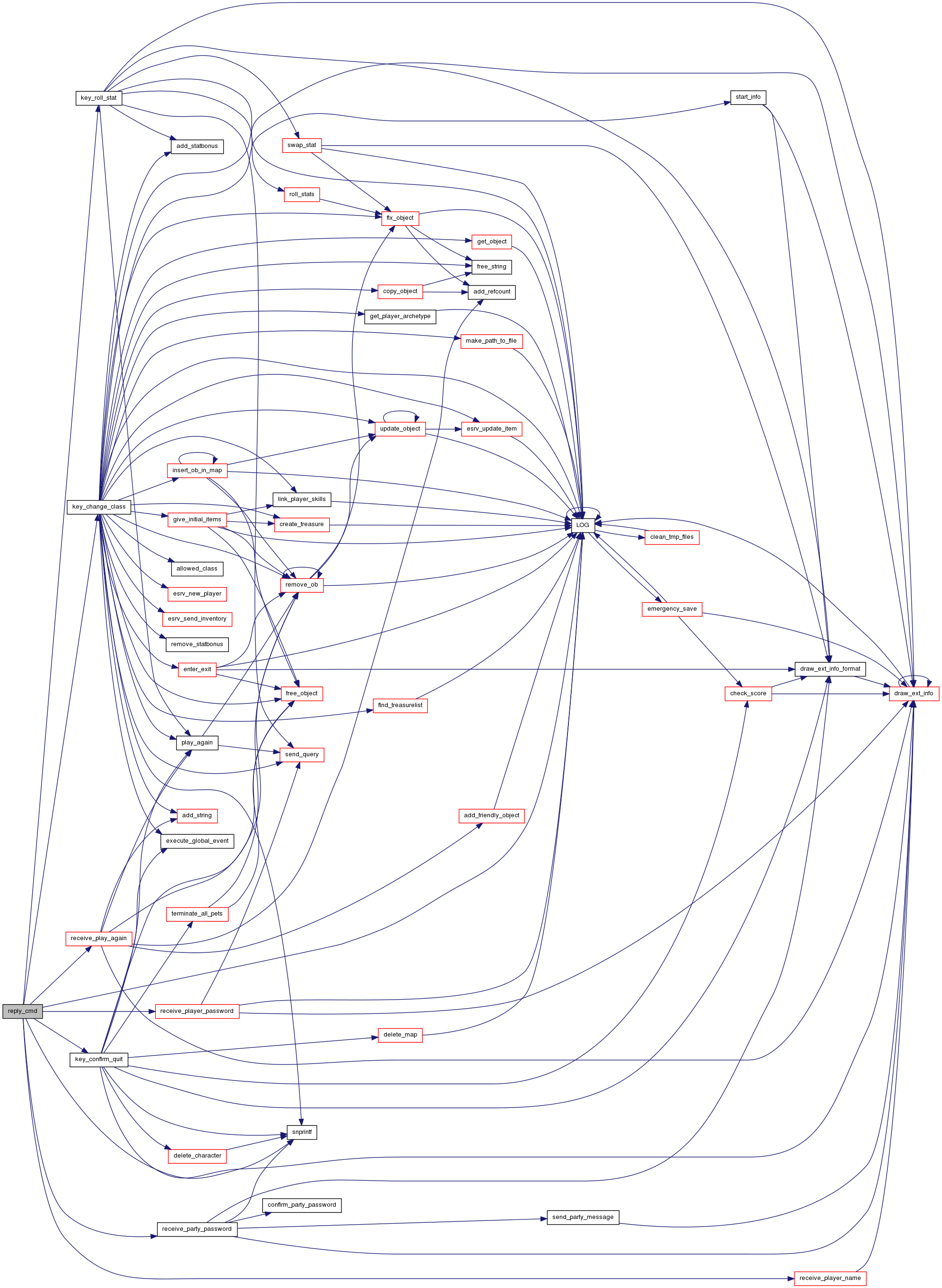
| void send_class_info | ( | socket_struct * | ns, |
| char * | params | ||
| ) |
Send information on the specified class.
- Parameters:
-
ns where to send. params class name to send.
- Todo:
- finish writing
Definition at line 1664 of file request.c.
Referenced by request_info_cmd().

| void send_class_list | ( | socket_struct * | ns, |
| char * | params | ||
| ) |
Sends the list of classes to the client.
The reply is kept in a static buffer, as it won't change during server run.
- Parameters:
-
ns client to send to. params ignored.
Definition at line 1642 of file request.c.
References build_class_list_reply(), Send_With_Handling(), and SockList_Init().
Referenced by request_info_cmd().
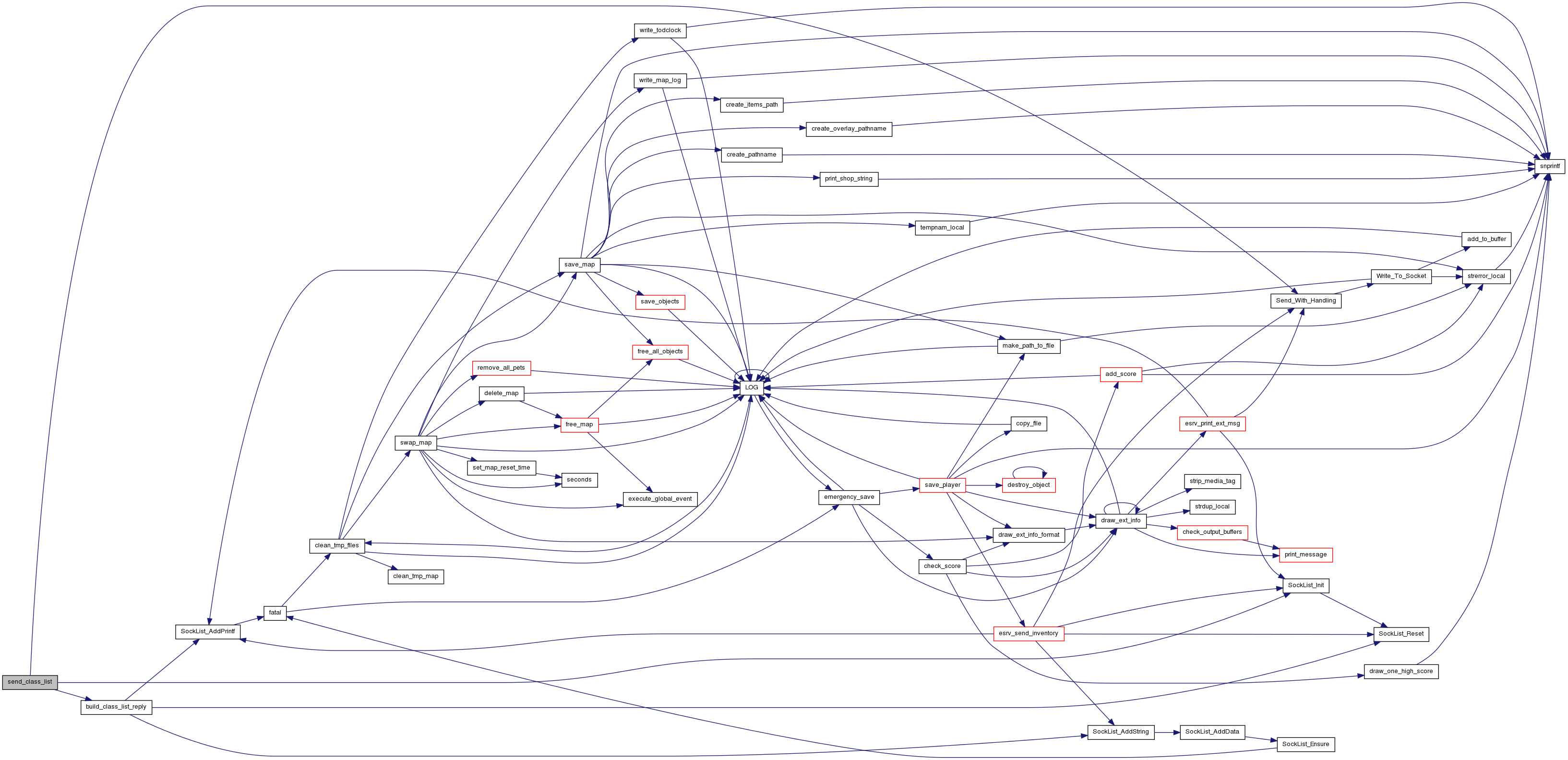

| void send_exp_table | ( | socket_struct * | ns, |
| char * | params | ||
| ) |
This sends the experience table the sever is using.
Definition at line 1482 of file request.c.
References levels, llevError, LOG(), Settings::max_level, Send_With_Handling(), settings, SockList_AddInt64(), SockList_AddShort(), SockList_AddString(), SockList_Avail(), SockList_Init(), and SockList_Term().
Referenced by request_info_cmd().
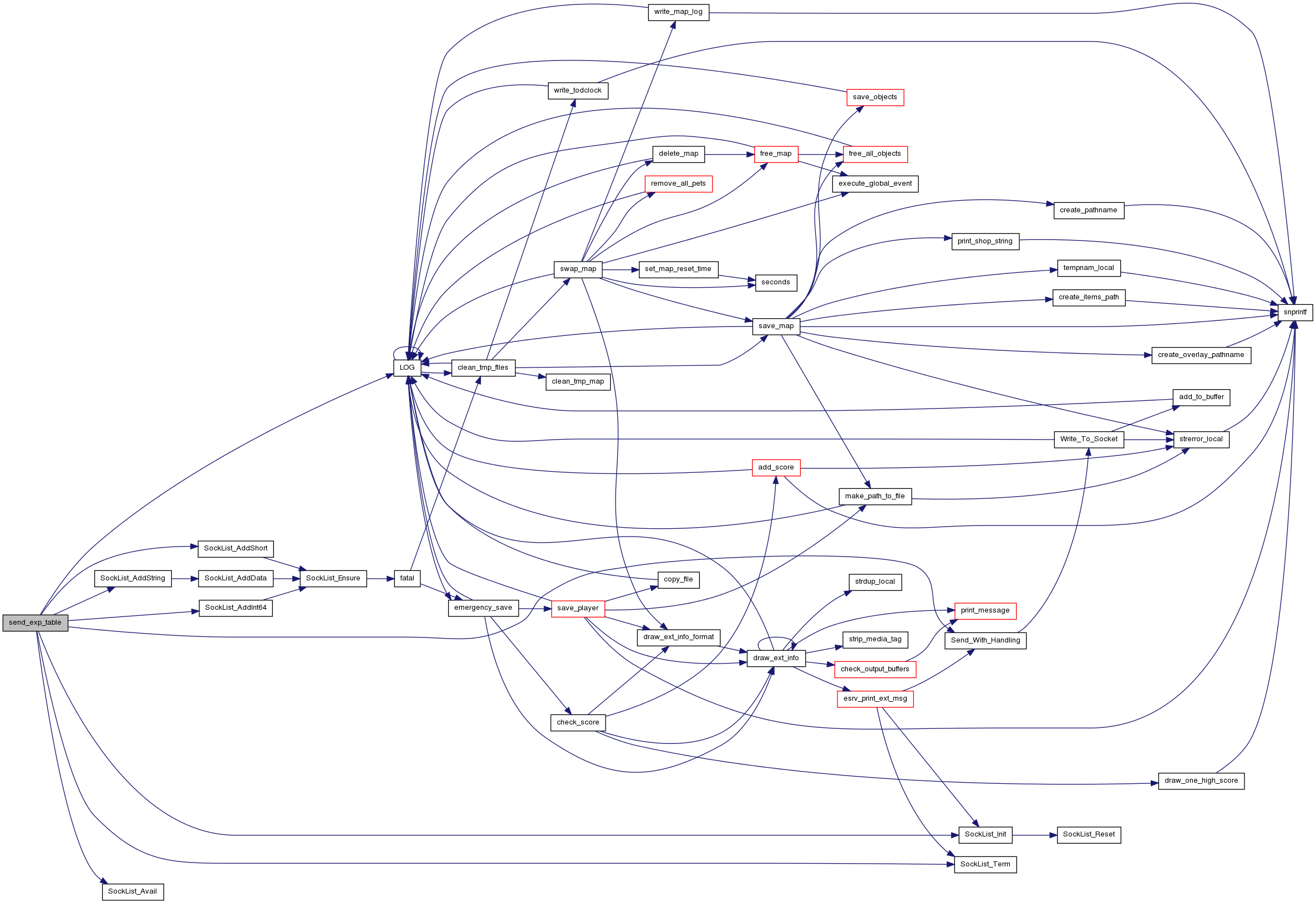

| void send_plugin_custom_message | ( | object * | pl, |
| char * | buf | ||
| ) |
GROS: The following one is used to allow a plugin to send a generic cmd to a player.
Of course, the client need to know the command to be able to manage it !
Definition at line 1470 of file request.c.
References Send_With_Handling(), SockList_AddString(), SockList_Init(), and SockList_Term().
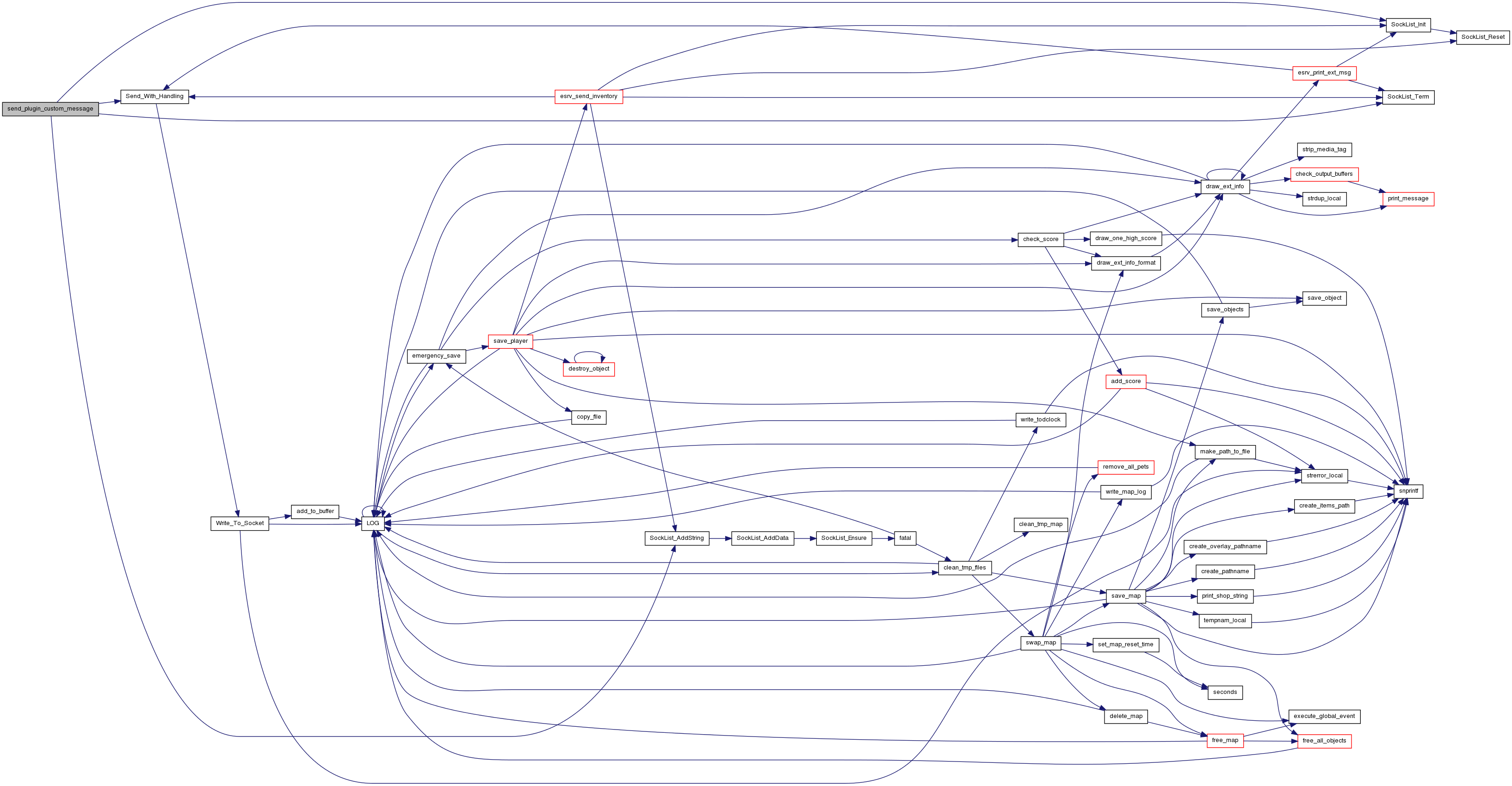
| void send_query | ( | socket_struct * | ns, |
| uint8 | flags, | ||
| const char * | text | ||
| ) |
Asks the client to query the user.
This way, the client knows it needs to send something back (vs just printing out a message)
Definition at line 727 of file request.c.
References Send_With_Handling(), SockList_AddPrintf(), SockList_Init(), and SockList_Term().
Referenced by command_passwd(), command_quit(), confirm_password(), get_name(), get_party_password(), get_password(), key_change_class(), key_roll_stat(), play_again(), receive_player_password(), and roll_again().
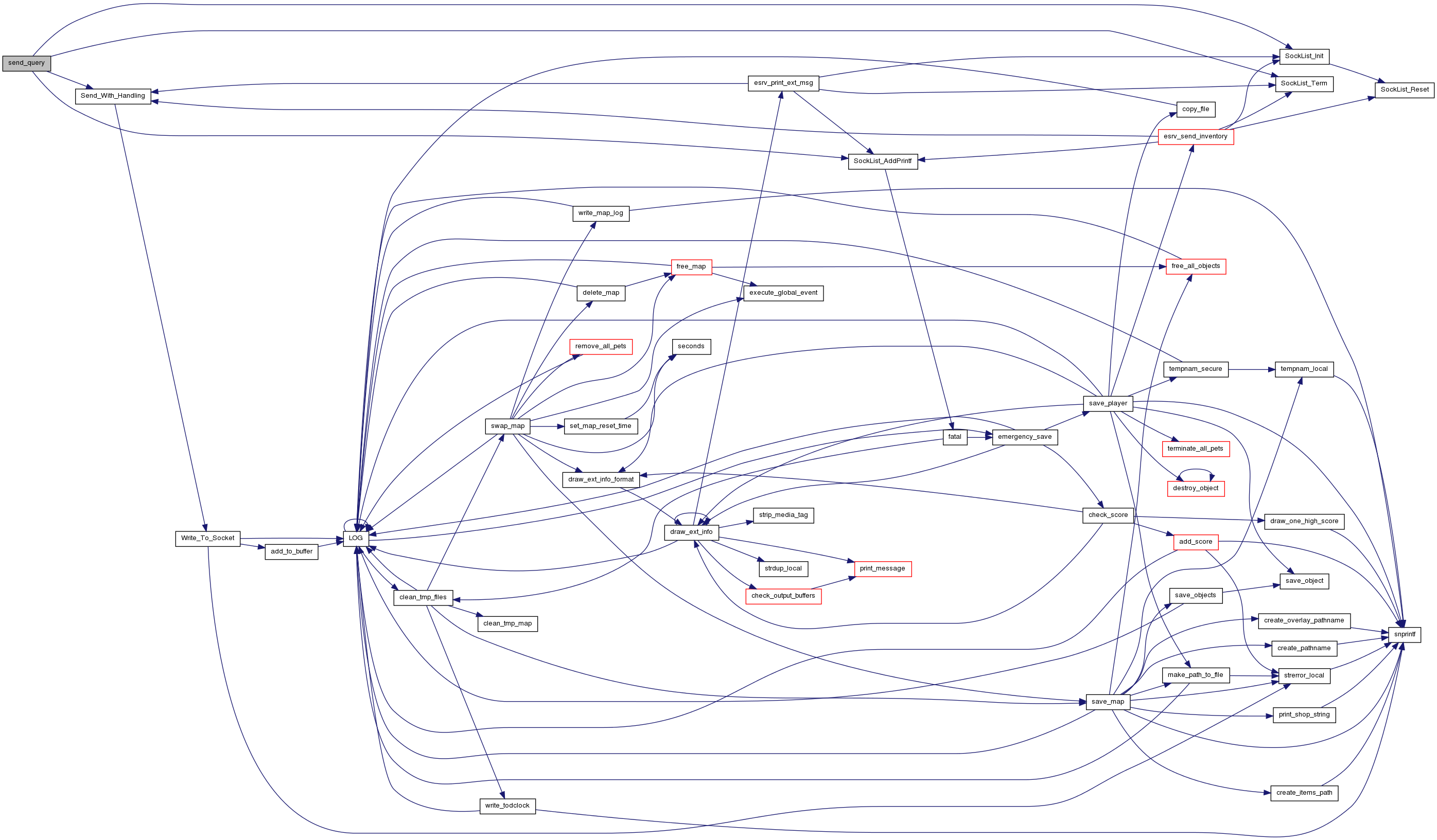
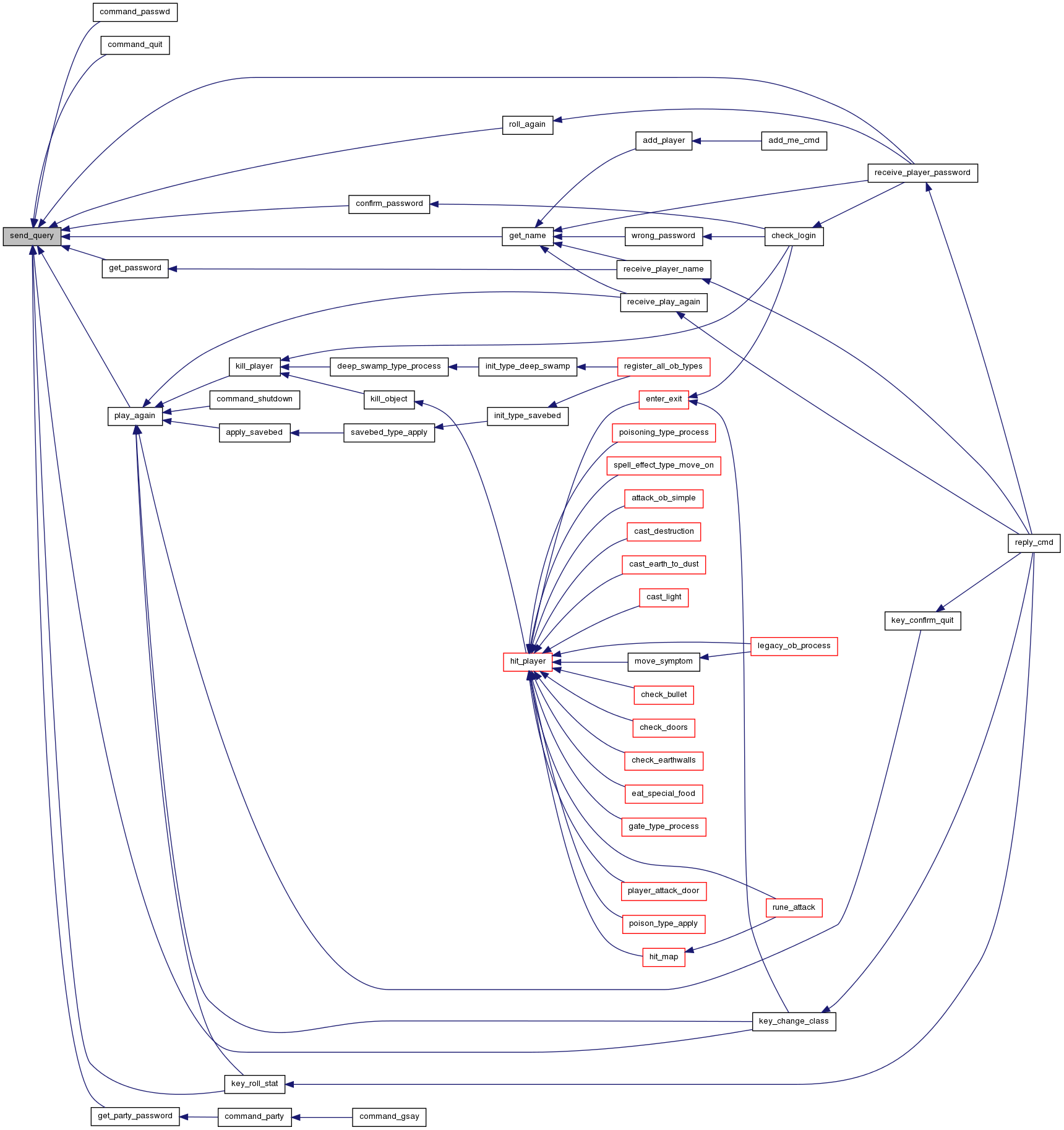
| void send_race_info | ( | socket_struct * | ns, |
| char * | params | ||
| ) |
Sends information on specified race to the client.
- Parameters:
-
ns where to send. params race name to send.
- Todo:
- finish writing
Definition at line 1600 of file request.c.
References Send_With_Handling(), SockList_AddPrintf(), SockList_Init(), SockList_Term(), and try_find_archetype().
Referenced by request_info_cmd().
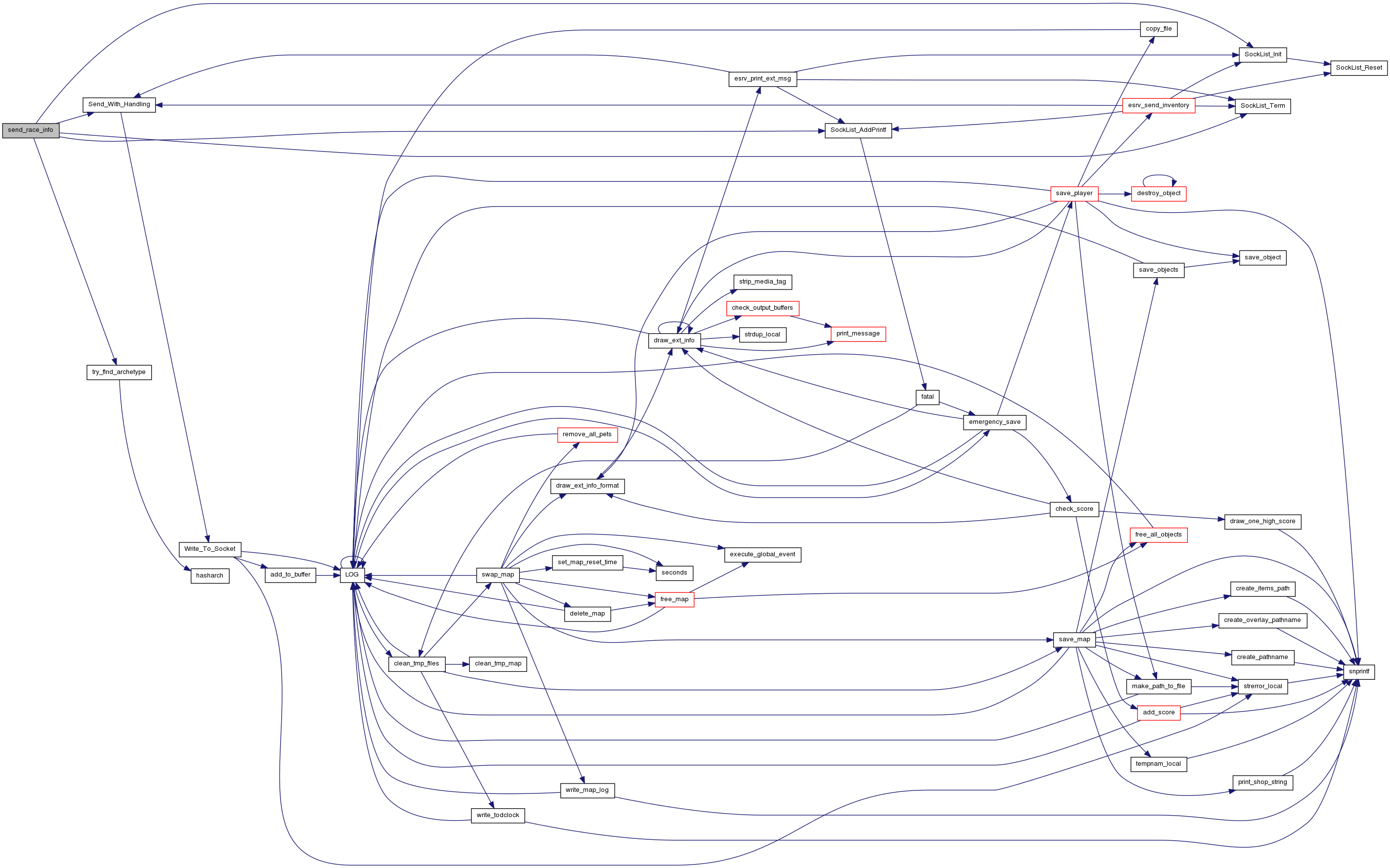

| void send_race_list | ( | socket_struct * | ns, |
| char * | params | ||
| ) |
Send the list of player races to the client.
The reply is kept in a static buffer, as it won't change during server run.
- Parameters:
-
ns where to send. params ignored.
Definition at line 1578 of file request.c.
References build_race_list_reply(), Send_With_Handling(), and SockList_Init().
Referenced by request_info_cmd().
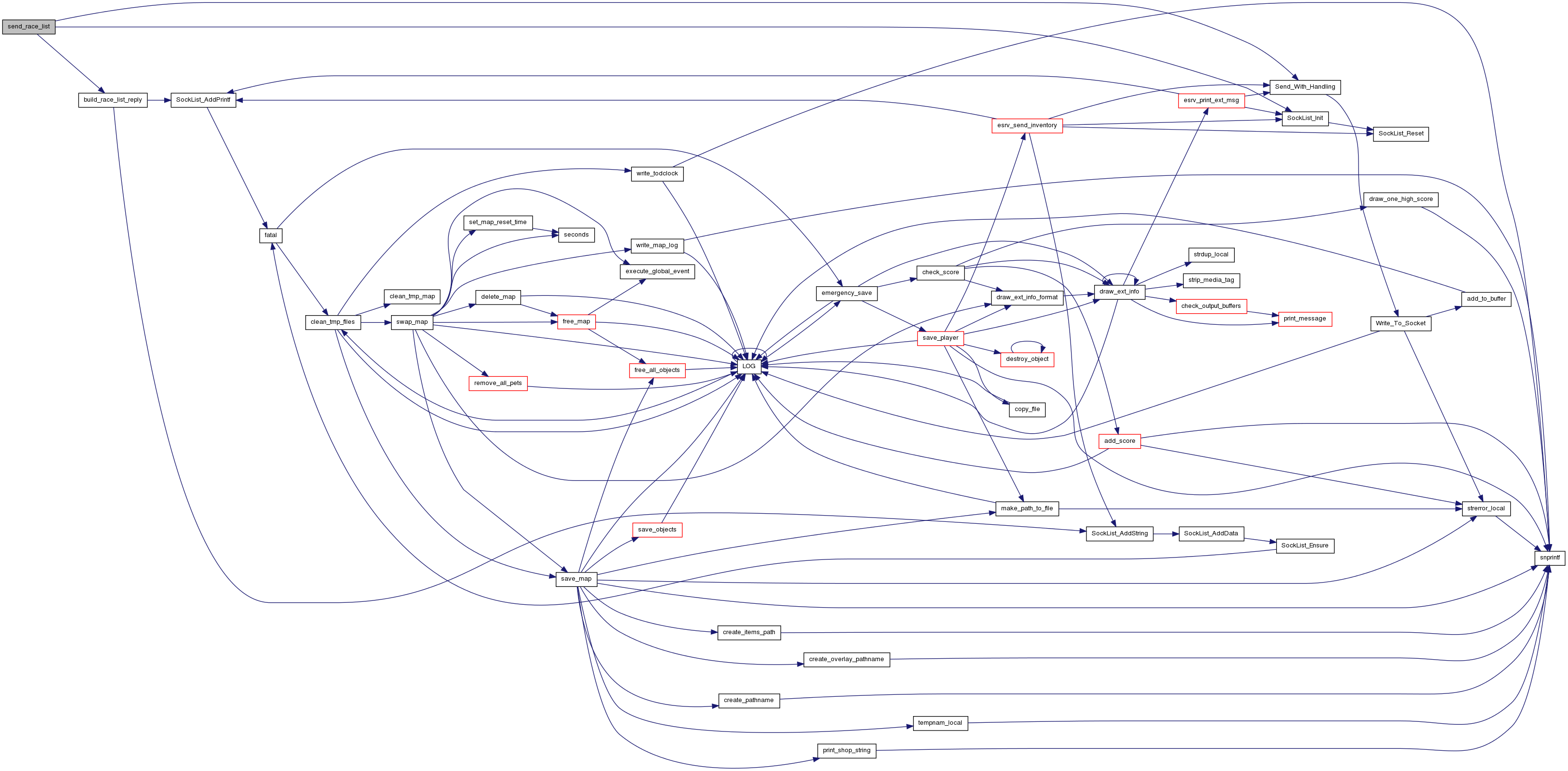

| void send_skill_info | ( | socket_struct * | ns, |
| char * | params | ||
| ) |
This sends the skill number to name mapping.
We ignore the params - we always send the same info no matter what.
Definition at line 1505 of file request.c.
References CS_STAT_SKILLINFO, llevError, LOG(), NUM_SKILLS, Send_With_Handling(), skill_names, SockList_AddPrintf(), SockList_AddString(), SockList_Avail(), SockList_Init(), and SockList_Term().
Referenced by request_info_cmd().
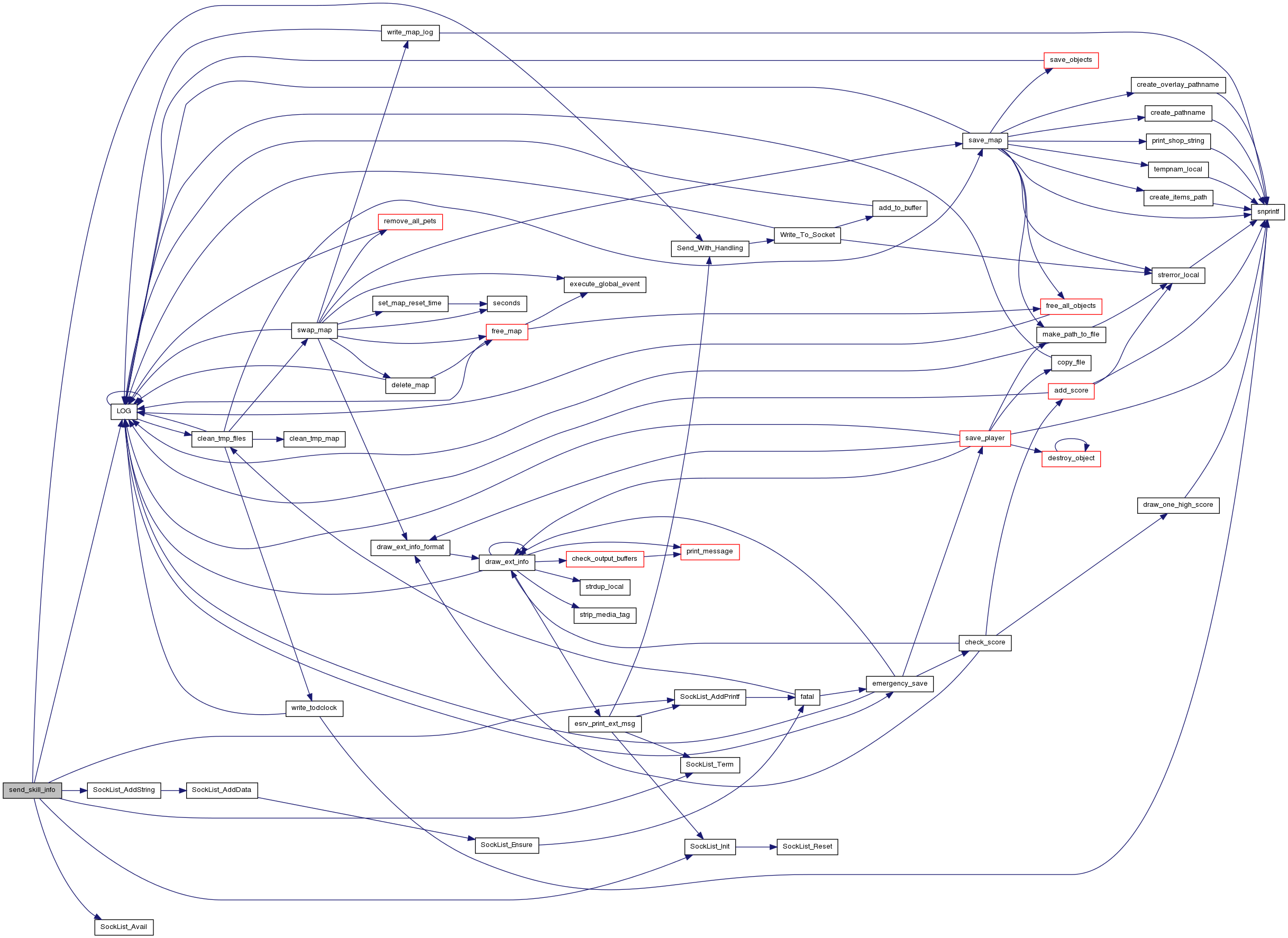

| static void send_smooth | ( | socket_struct * | ns, |
| uint16 | face | ||
| ) | [static] |
A lot like the old AskSmooth (in fact, now called by AskSmooth).
Basically, it makes no sense to wait for the client to request a a piece of data from us that we know the client wants. So if we know the client wants it, might as well push it to the client.
Definition at line 442 of file request.c.
References esrv_send_face(), socket_struct::faces_sent, find_smooth(), llevError, LOG(), new_face_struct::name, NS_FACESENT_FACE, NS_FACESENT_SMOOTH, new_face_struct::number, Send_With_Handling(), smooth_face, SockList_AddShort(), SockList_AddString(), SockList_Init(), and SockList_Term().
Referenced by ask_smooth_cmd(), and map2_add_ob().
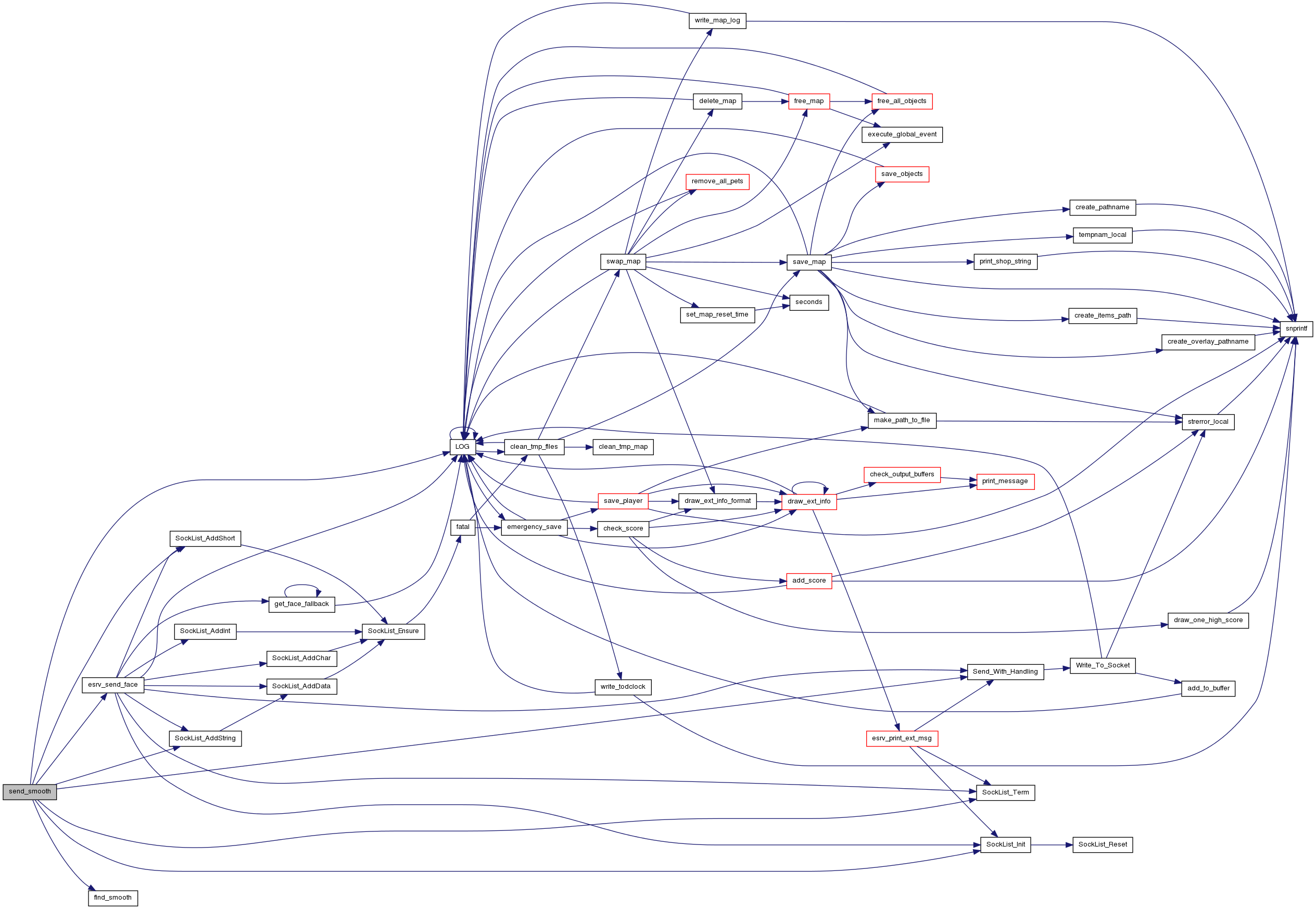

| void send_spell_paths | ( | socket_struct * | ns, |
| char * | params | ||
| ) |
This sends the spell path to name mapping.
We ignore the params - we always send the same info no matter what.
Definition at line 1530 of file request.c.
References llevError, LOG(), NRSPELLPATHS, Send_With_Handling(), SockList_AddPrintf(), SockList_AddString(), SockList_Avail(), SockList_Init(), SockList_Term(), and spellpathnames.
Referenced by request_info_cmd().
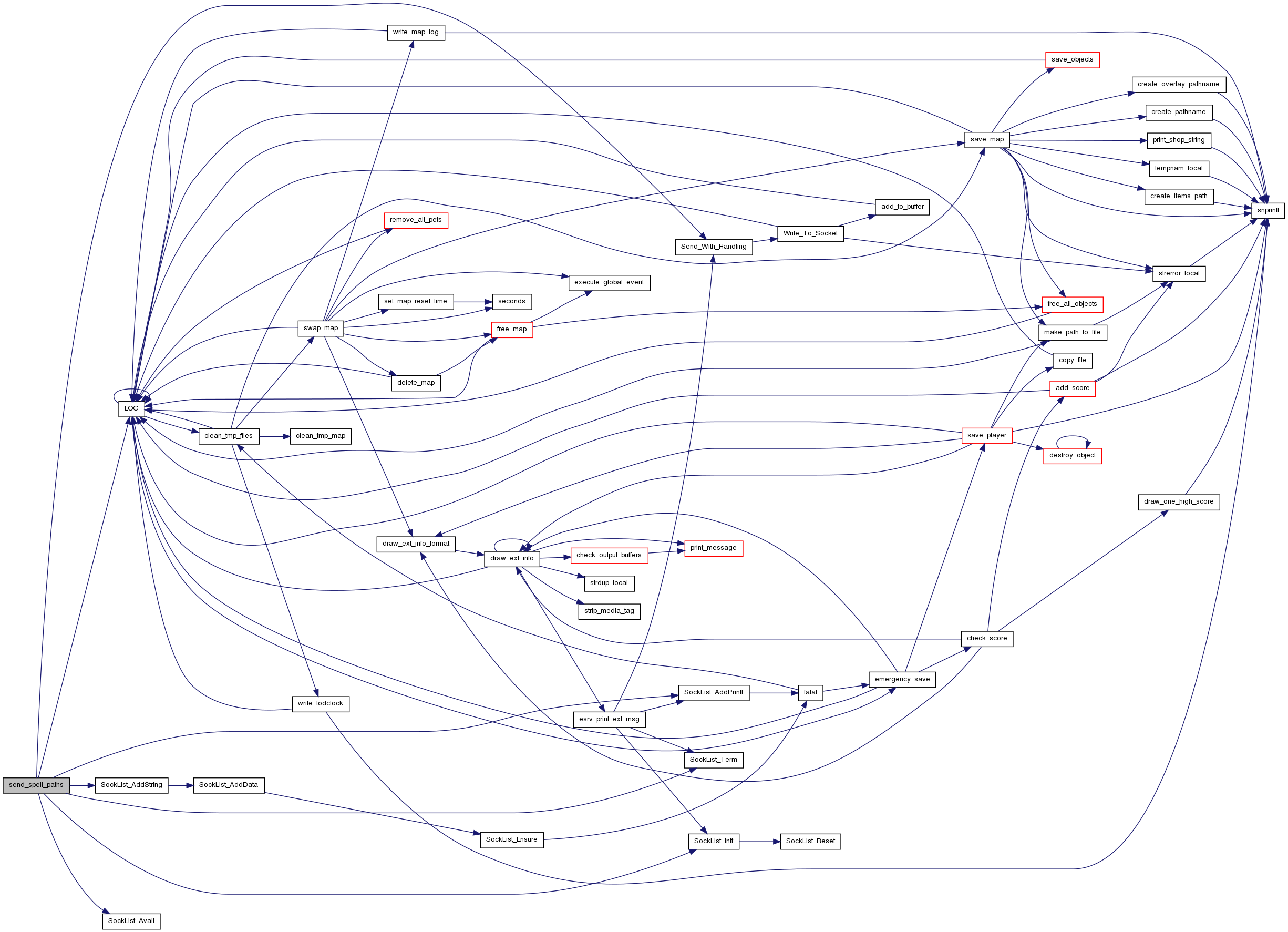

Definition at line 1863 of file request.c.
References socket_struct::fd, llevError, LOG(), pticks, Send_With_Handling(), pl::socket, SockList_AddInt(), SockList_AddString(), SockList_Init(), and SockList_Term().
Referenced by do_server().
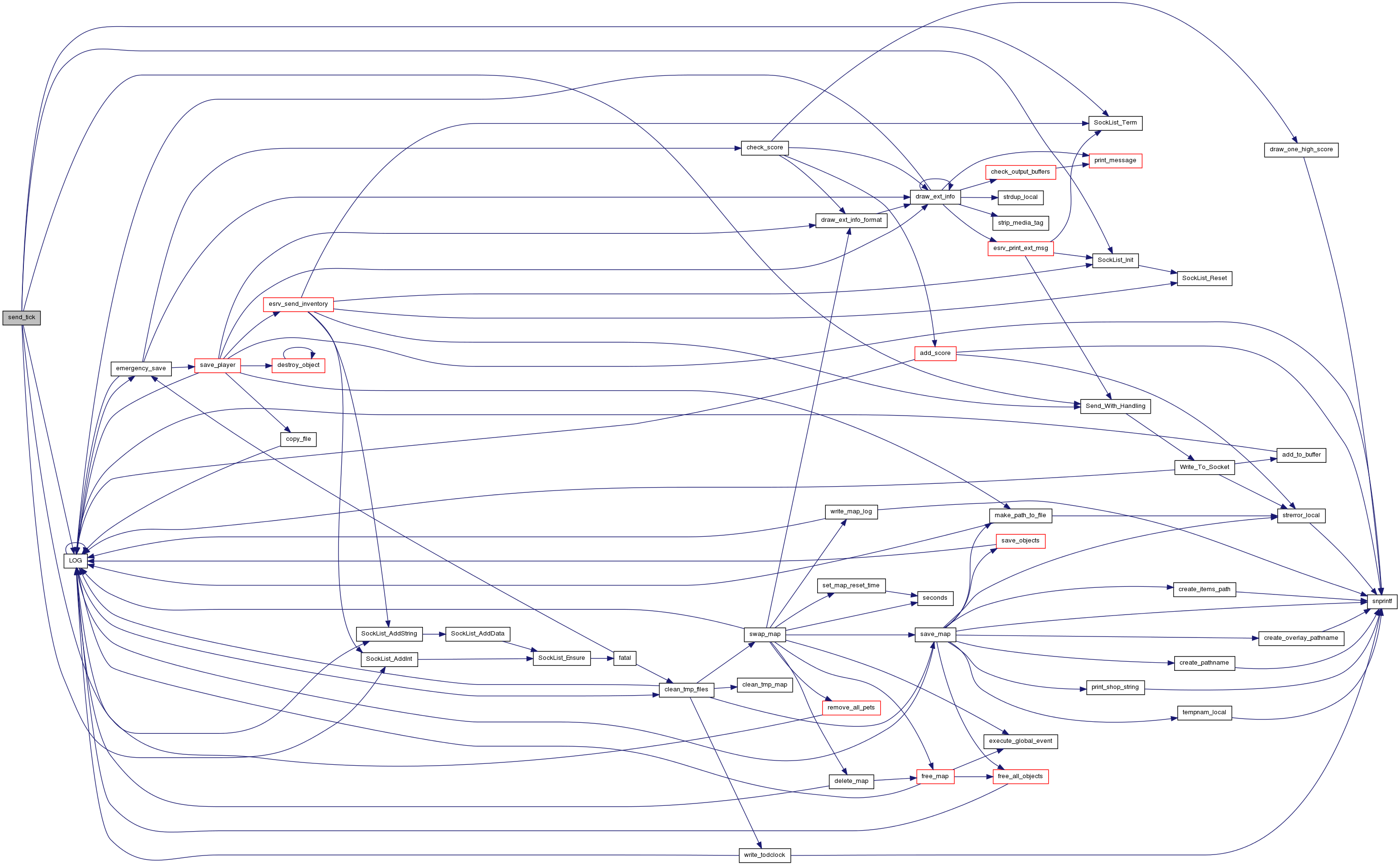

| void set_sound_cmd | ( | char * | buf, |
| int | len, | ||
| socket_struct * | ns | ||
| ) |
| void set_up_cmd | ( | char * | buf, |
| int | len, | ||
| socket_struct * | ns | ||
| ) |
This is the Setup cmd - easy first implementation.
Definition at line 116 of file request.c.
References socket_struct::darkness, socket_struct::facecache, socket_struct::faceset, socket_struct::has_readable_type, socket_struct::is_bot, is_valid_faceset(), llevInfo, LOG(), MAP_CLIENT_X, MAP_CLIENT_Y, map_newmap_cmd(), socket_struct::mapx, socket_struct::mapy, MAX_NUM_LOOK_OBJECTS, MIN_NUM_LOOK_OBJECTS, socket_struct::monitor_spells, socket_struct::newmapcmd, socket_struct::num_look_objects, Send_With_Handling(), SND_EFFECTS, SND_MUSIC, SND_MUTE, SockList_AddPrintf(), SockList_AddString(), SockList_Init(), SockList_Term(), socket_struct::sound, socket_struct::tick, and socket_struct::want_pickup.
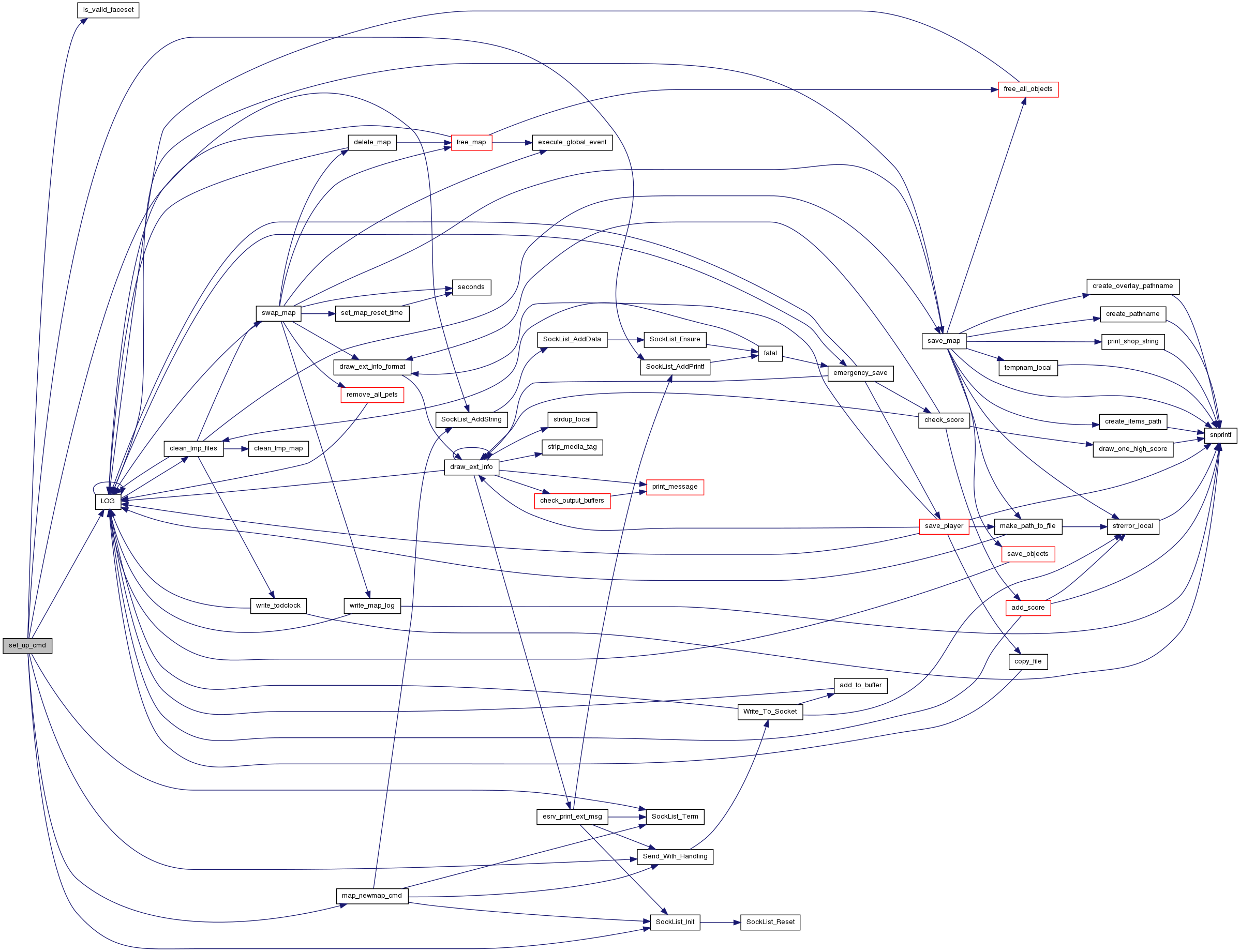
| void toggle_extended_infos_cmd | ( | char * | buf, |
| int | len, | ||
| socket_struct * | ns | ||
| ) |
Reply to ExtendedInfos command.
Definition at line 359 of file request.c.
References Send_With_Handling(), SockList_AddString(), SockList_Init(), and SockList_Term().
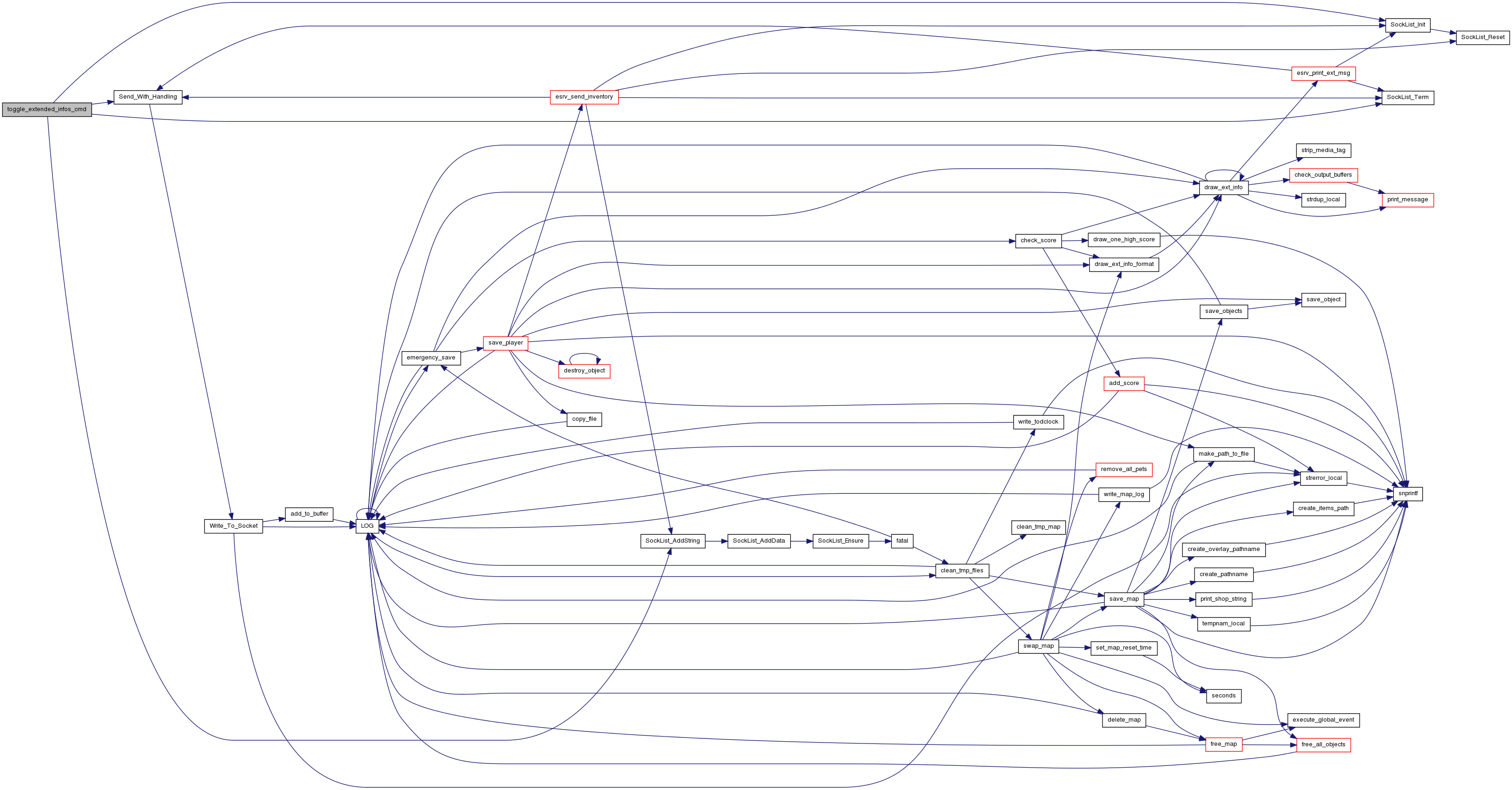
| void toggle_extended_text_cmd | ( | char * | buf, |
| int | len, | ||
| socket_struct * | ns | ||
| ) |
Reply to ExtendedInfos command.
Definition at line 398 of file request.c.
References MSG_TYPE_LAST, Send_With_Handling(), SockList_AddPrintf(), SockList_AddString(), SockList_Init(), SockList_Term(), and socket_struct::supported_readables.
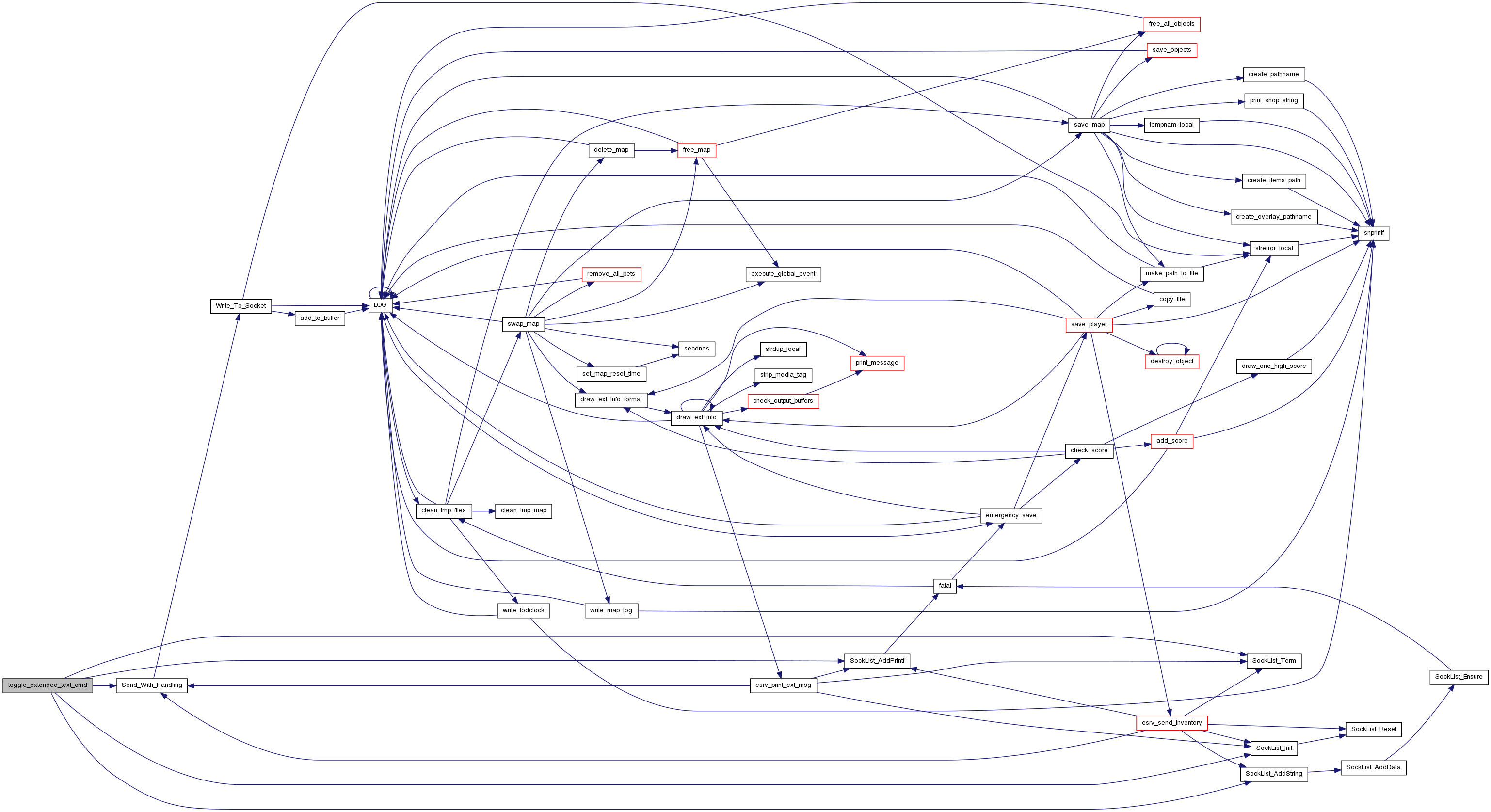
| void version_cmd | ( | char * | buf, |
| int | len, | ||
| socket_struct * | ns | ||
| ) |
Client tells its version.
If there is a mismatch, we close the socket. In real life, all we should care about is the client having something older than the server. If we assume the client will be backwards compatible, having it be a later version should not be a problem.
Definition at line 621 of file request.c.
References socket_struct::cs_version, socket_struct::host, llevDebug, llevError, LOG(), socket_struct::sc_version, VERSION_CS, and VERSION_SC.
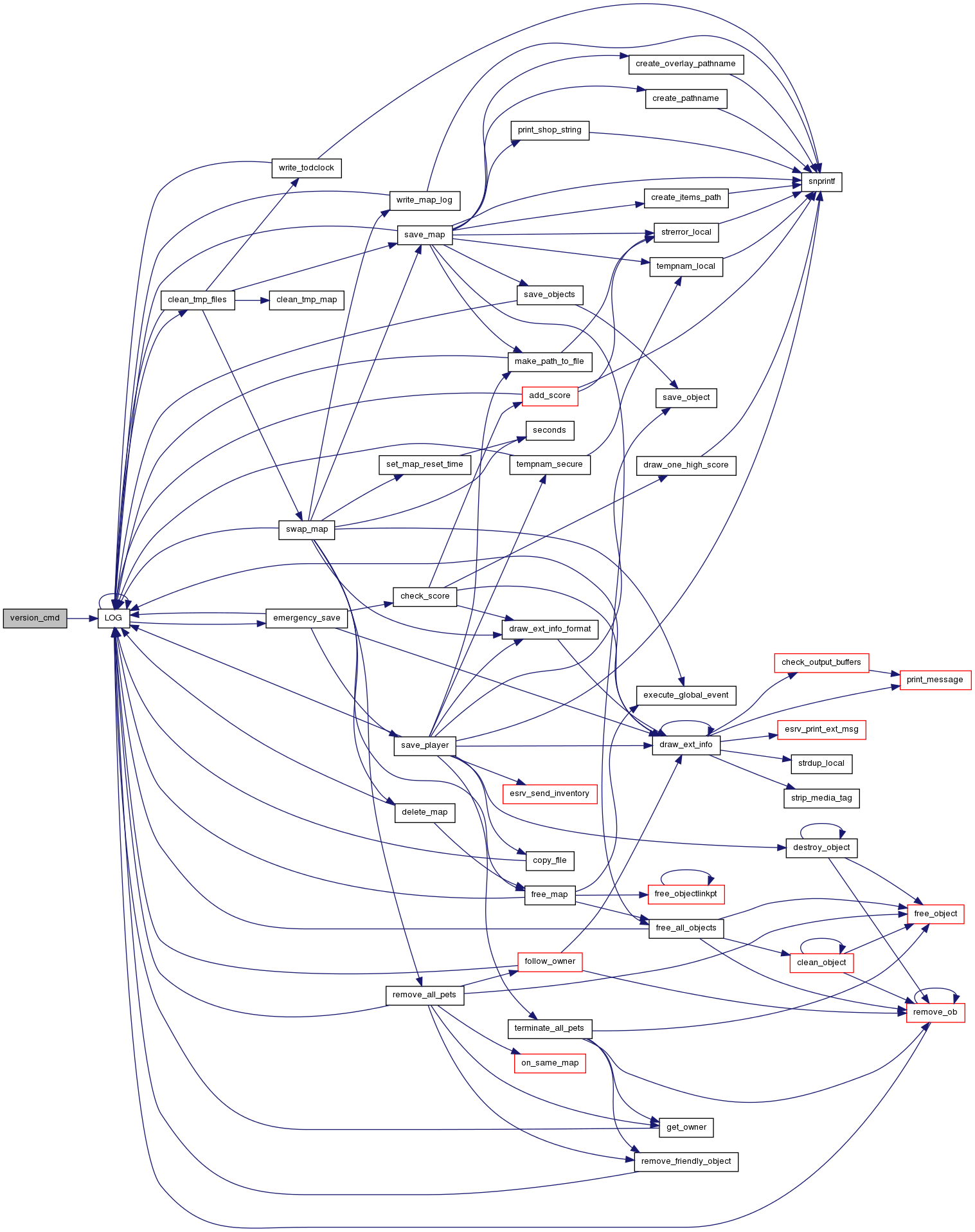
Variable Documentation
const short atnr_cs_stat[NROFATTACKS] [static] |
{
CS_STAT_RES_PHYS, CS_STAT_RES_MAG,
CS_STAT_RES_FIRE, CS_STAT_RES_ELEC,
CS_STAT_RES_COLD, CS_STAT_RES_CONF,
CS_STAT_RES_ACID,
CS_STAT_RES_DRAIN, -1 ,
CS_STAT_RES_GHOSTHIT, CS_STAT_RES_POISON,
CS_STAT_RES_SLOW, CS_STAT_RES_PARA,
CS_STAT_TURN_UNDEAD,
CS_STAT_RES_FEAR, -1 ,
CS_STAT_RES_DEPLETE, CS_STAT_RES_DEATH,
-1 , -1 ,
-1 , CS_STAT_RES_HOLYWORD,
CS_STAT_RES_BLIND,
-1,
-1,
-1
}
This table translates the attack numbers as used within the program to the value we use when sending STATS command to the client.
If a value is -1, then we don't send that to the client.
Definition at line 96 of file request.c.
Referenced by esrv_update_stats().
object* heads[MAX_HEAD_POS][MAX_HEAD_POS][MAP_LAYERS] [static] |
Using a global really isn't a good approach, but saves the over head of allocating and deallocating such a block of data each time run through, and saves the space of allocating this in the socket object when we only need it for this cycle.
If the serve is ever threaded, this needs to be re-examined.
Definition at line 947 of file request.c.
Referenced by check_space_for_heads(), draw_client_map2(), and map2_add_ob().
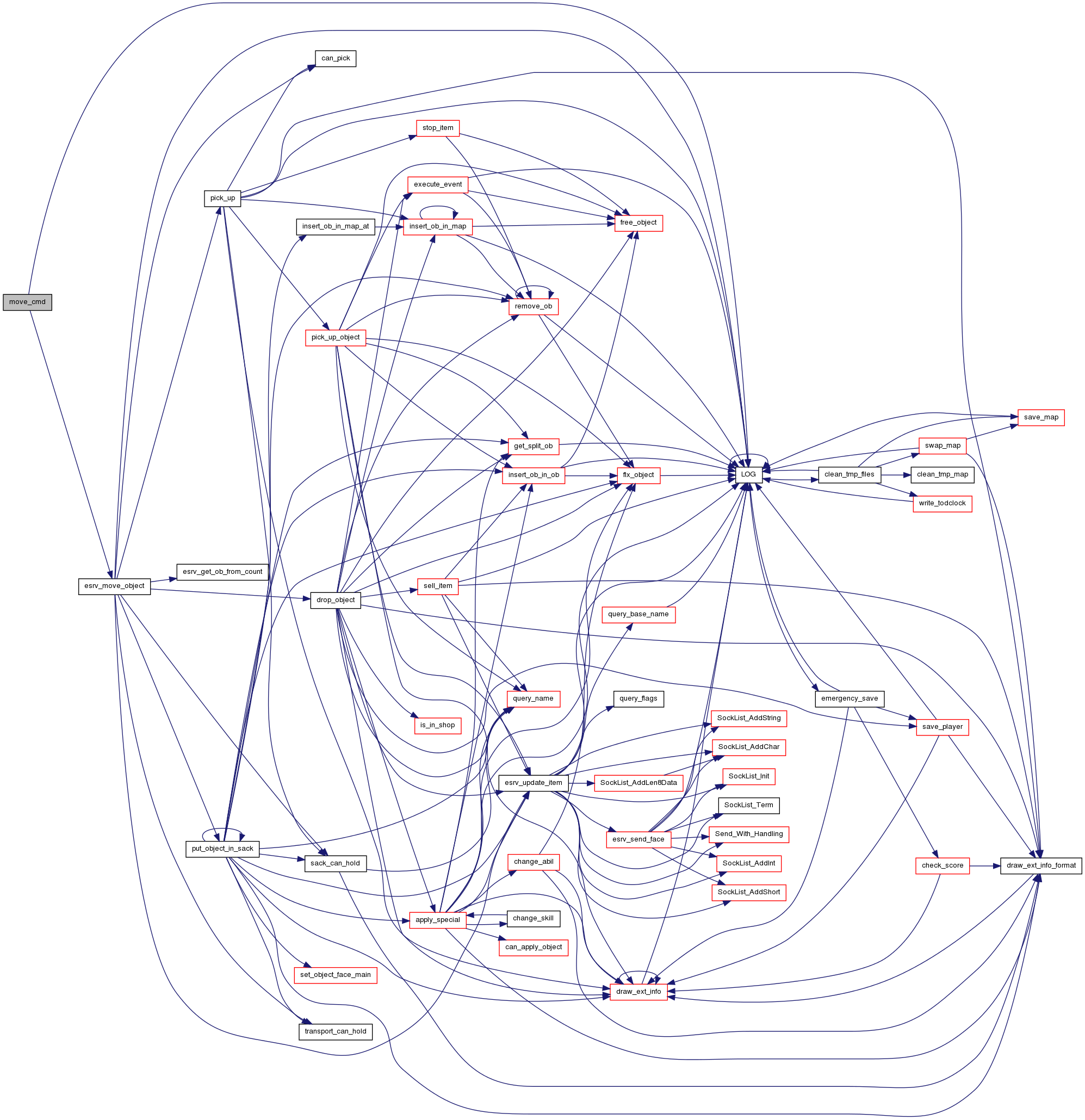
 1.7.6.1
1.7.6.1